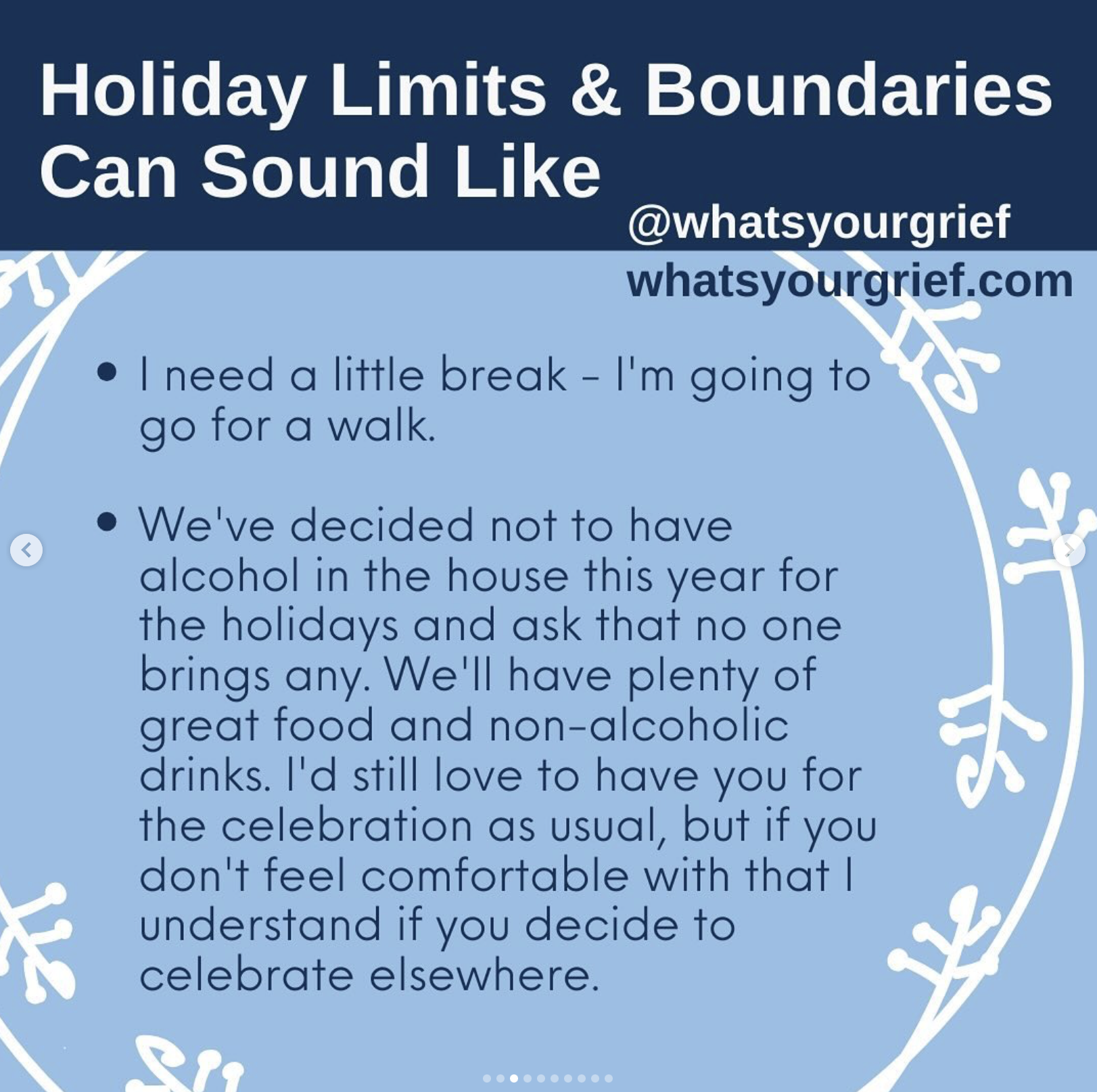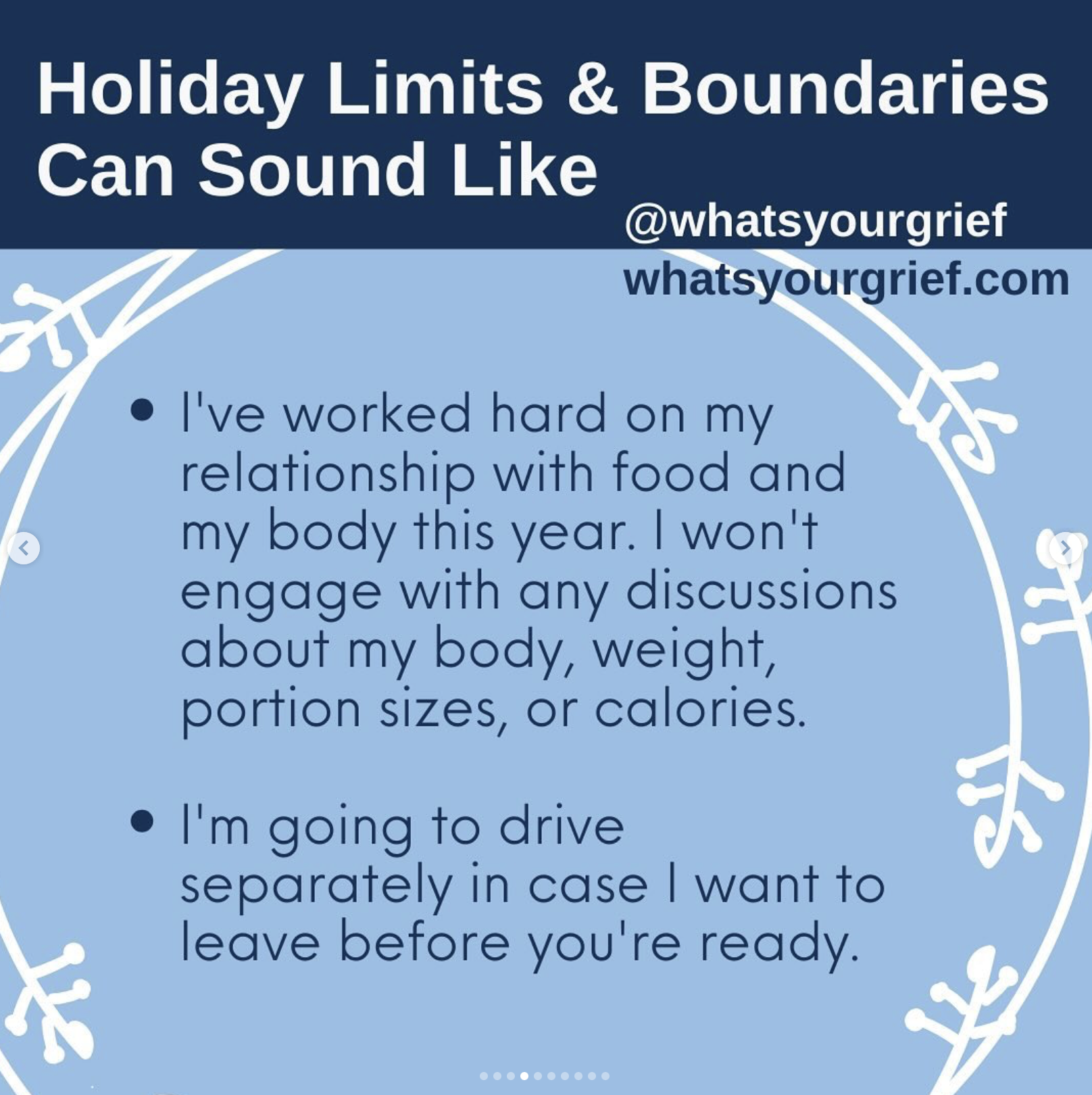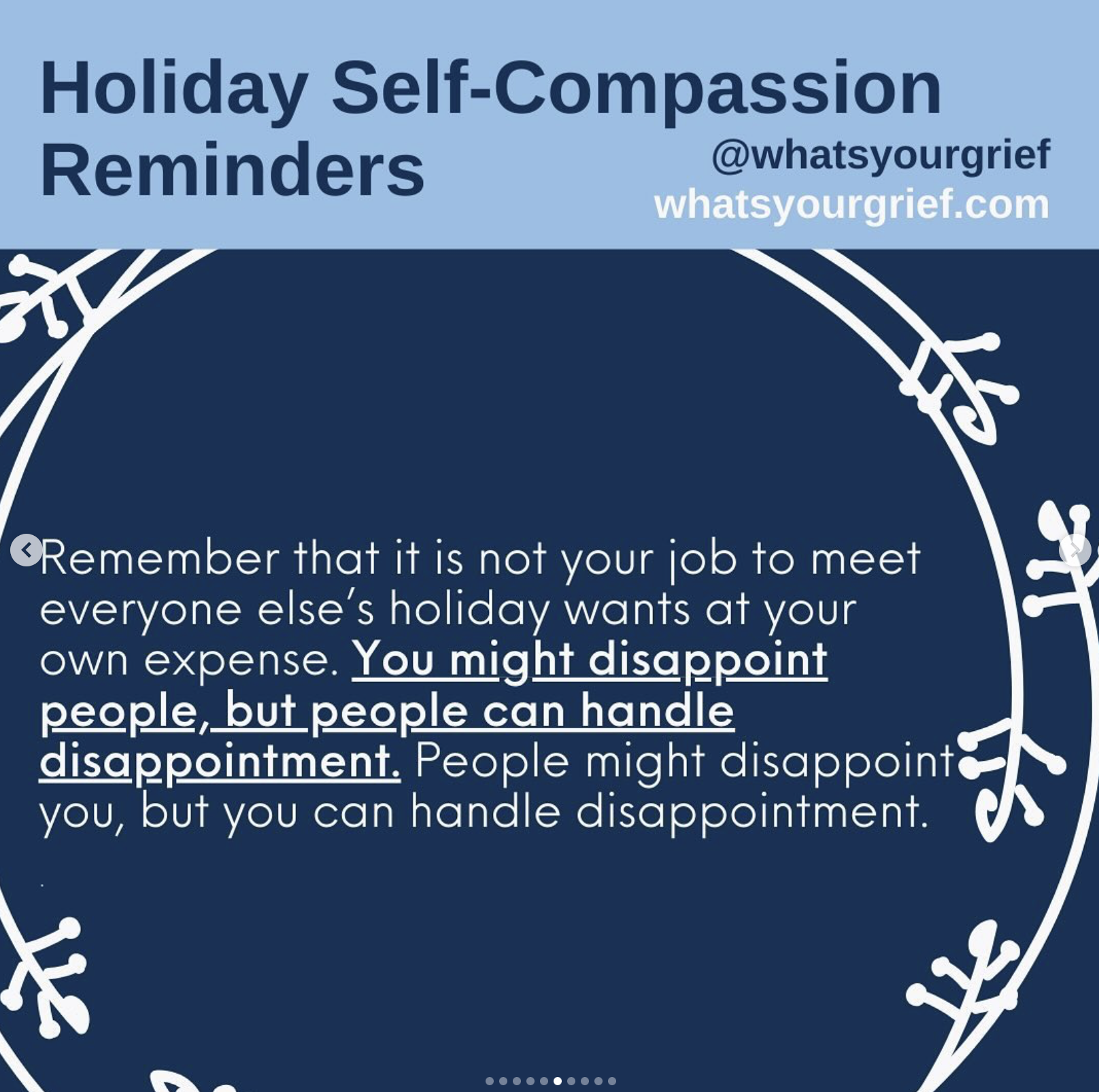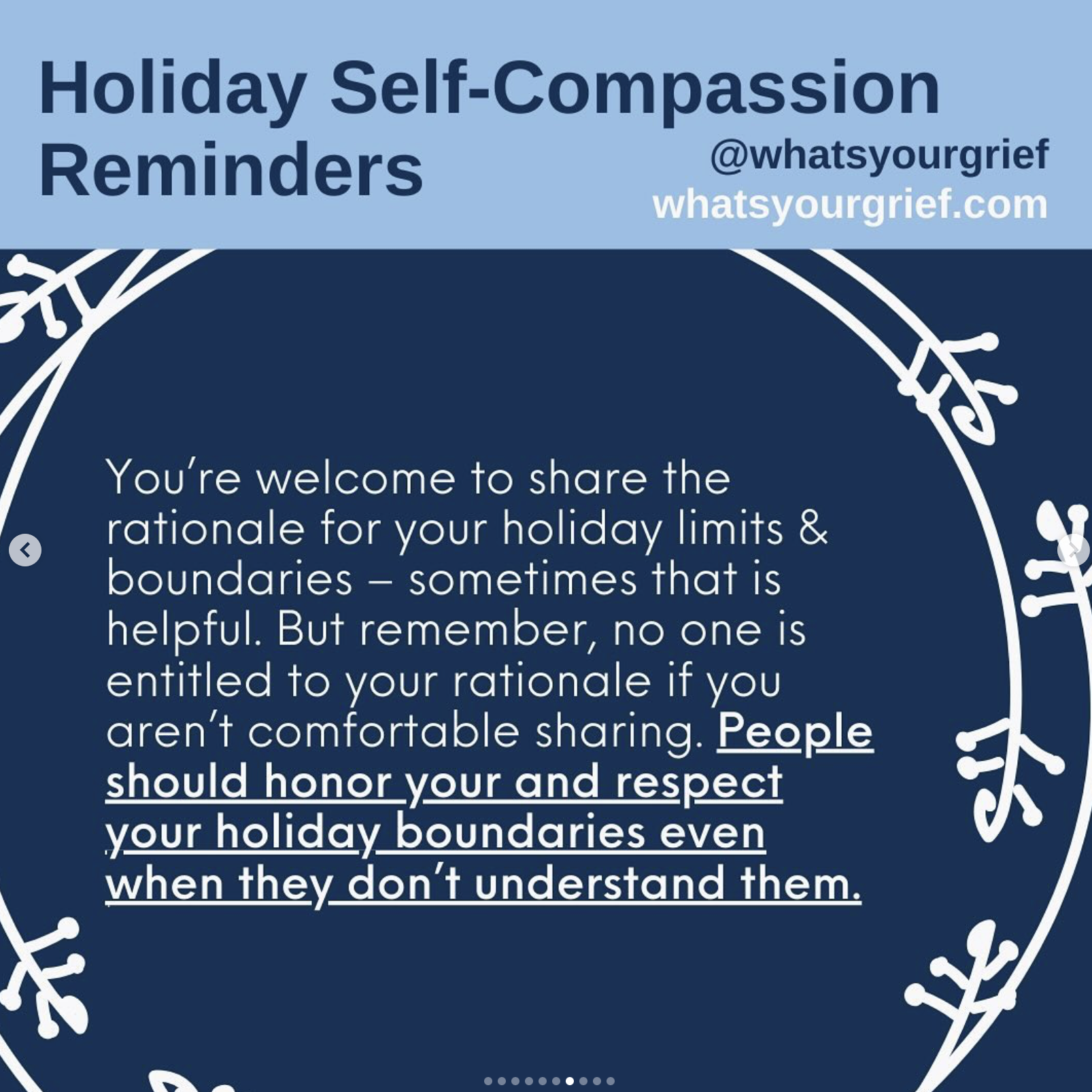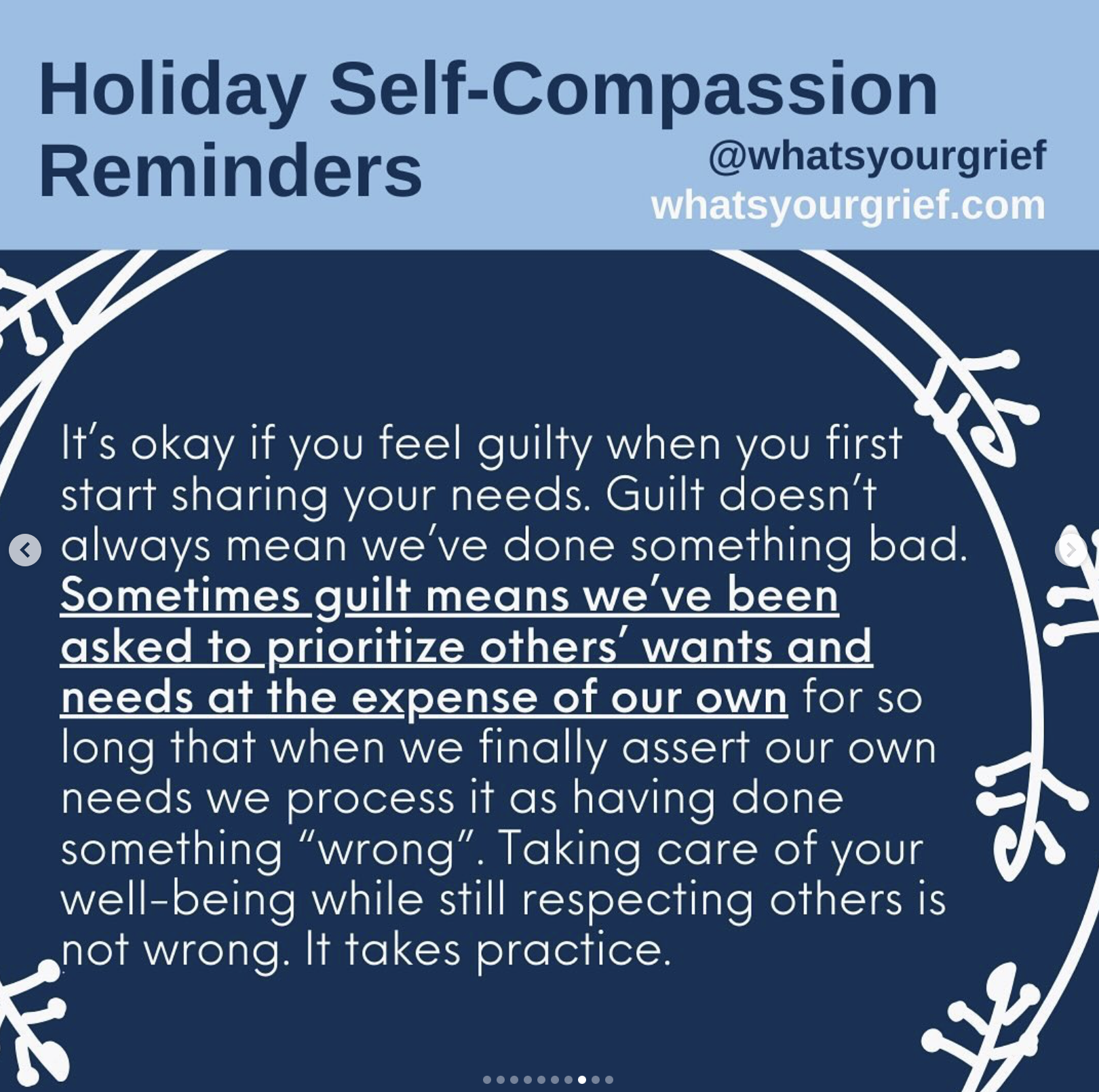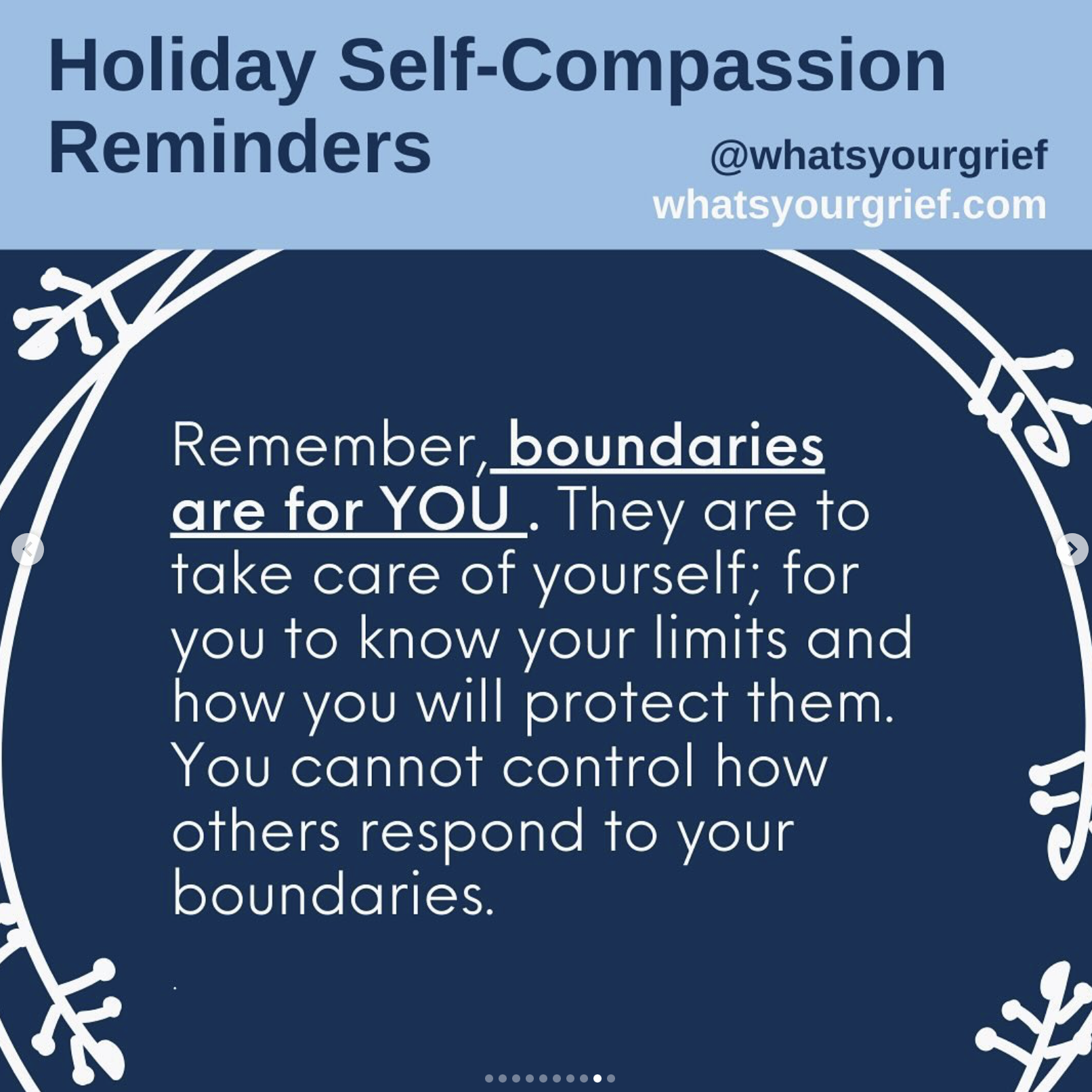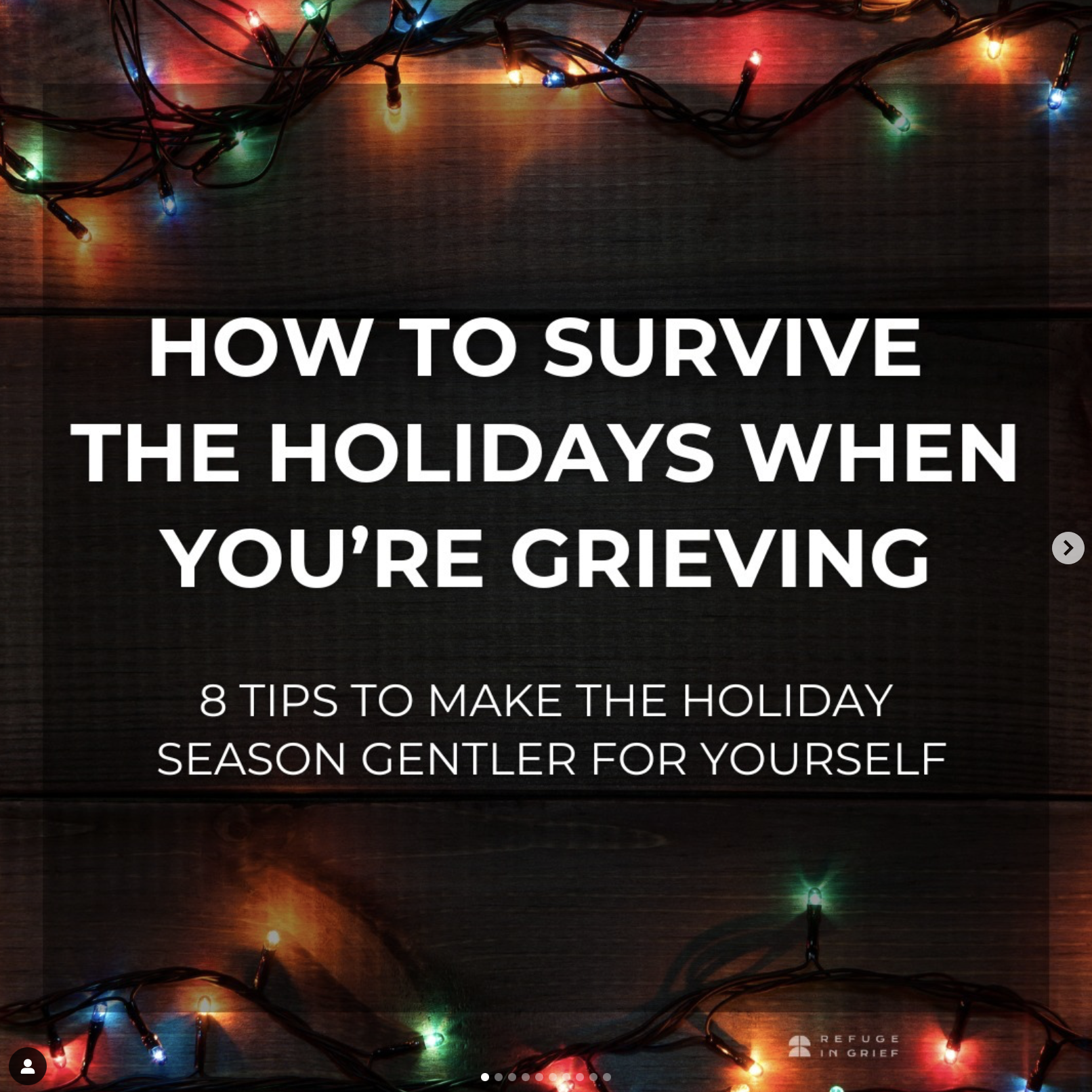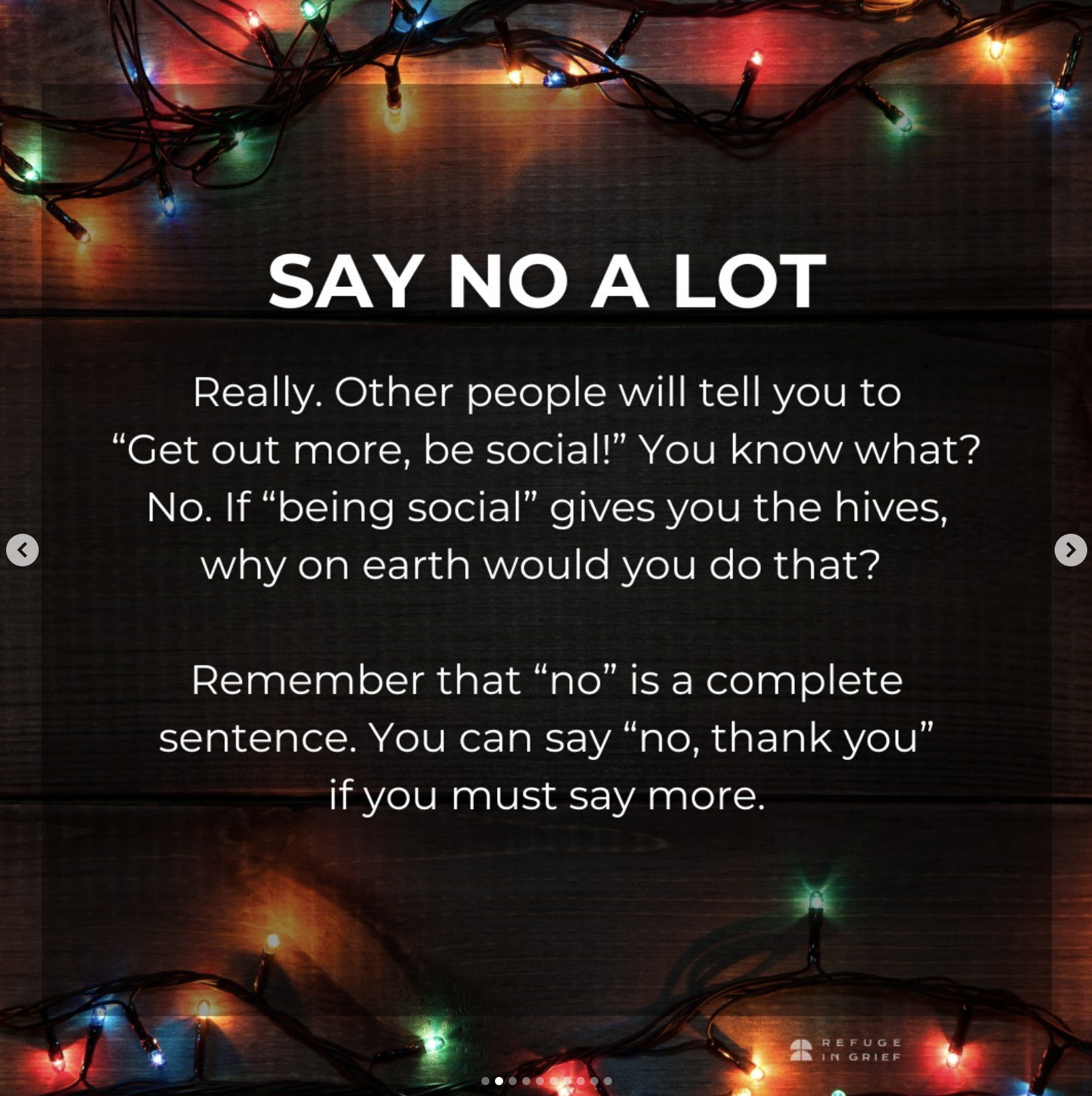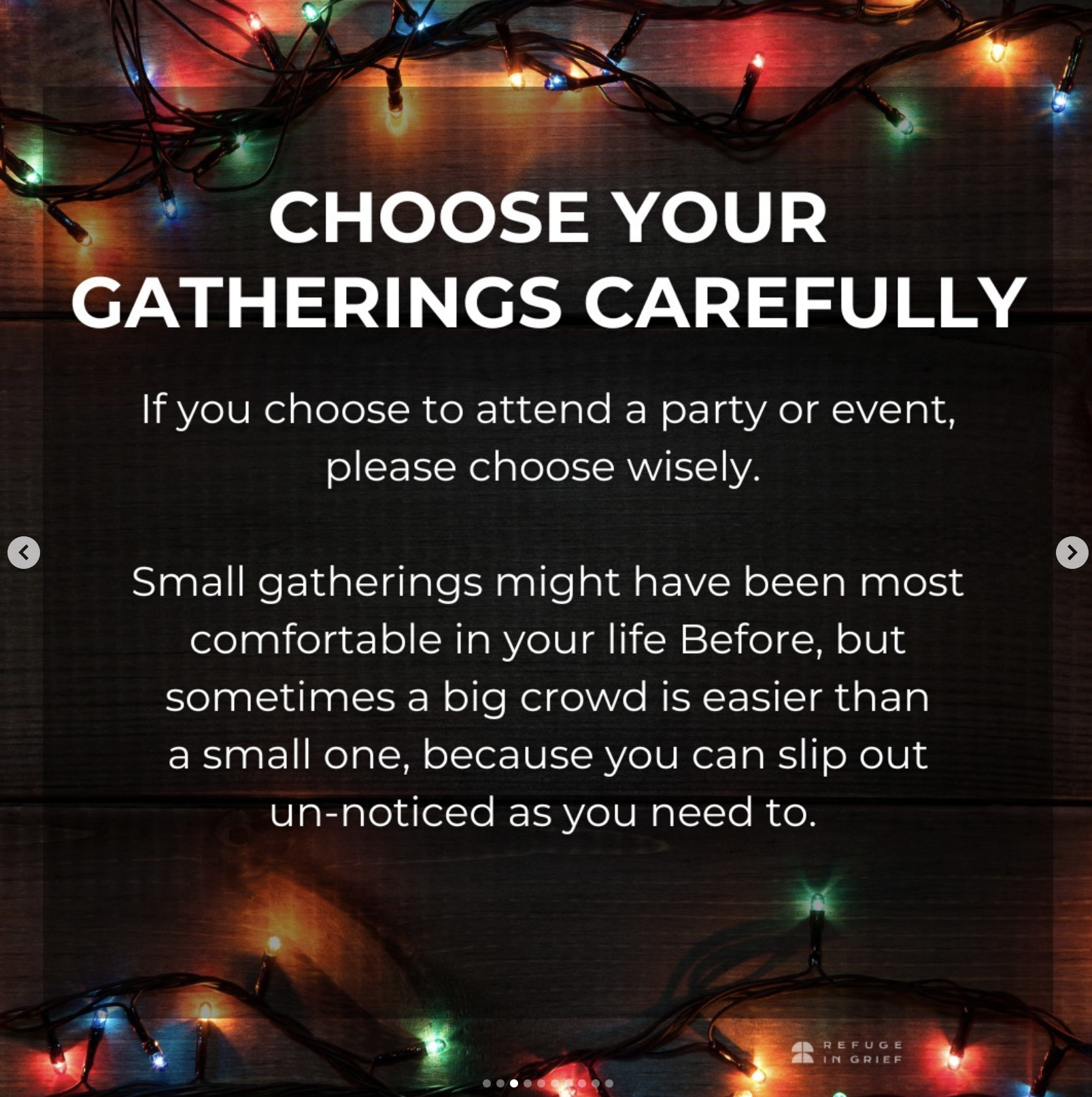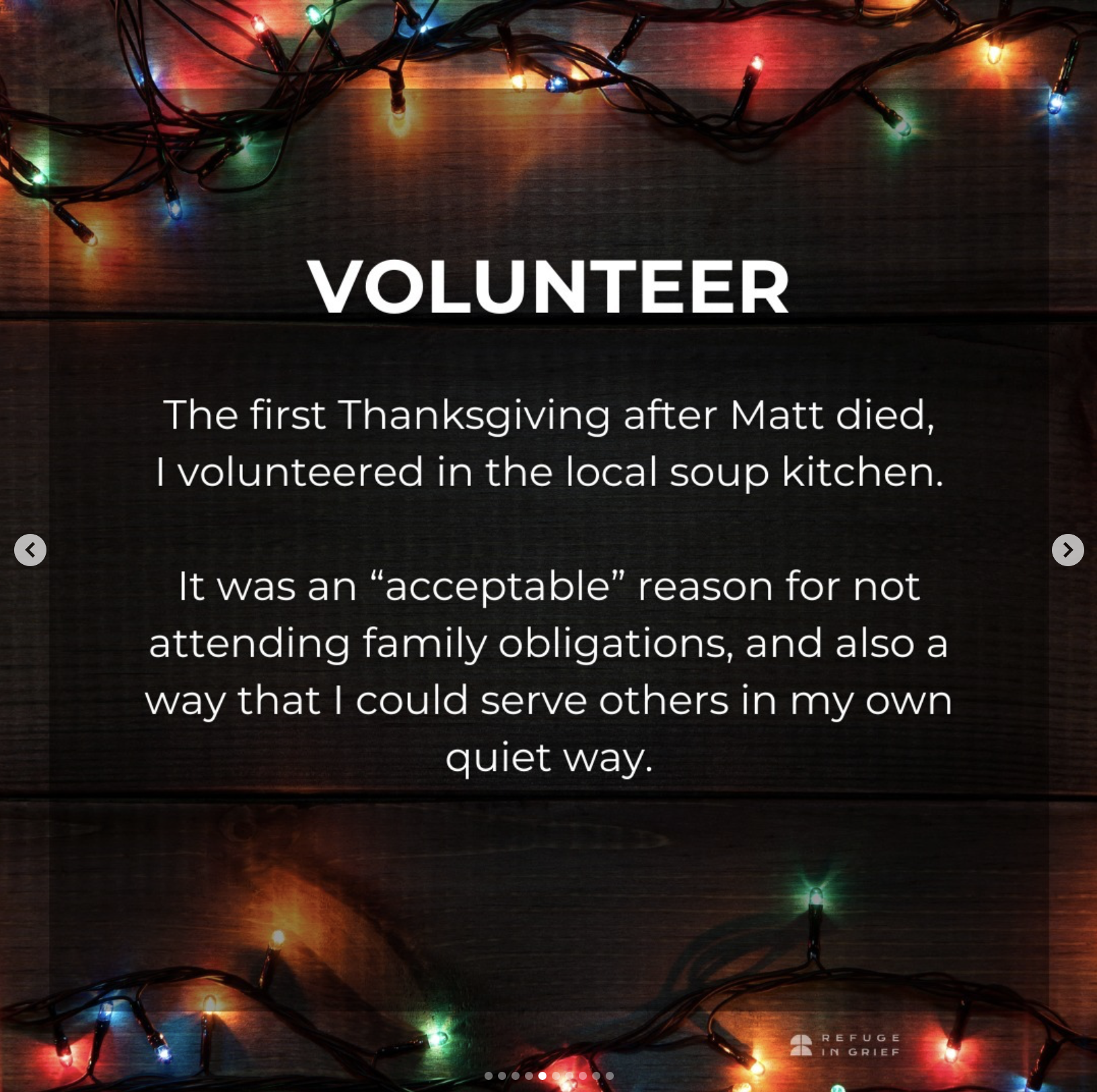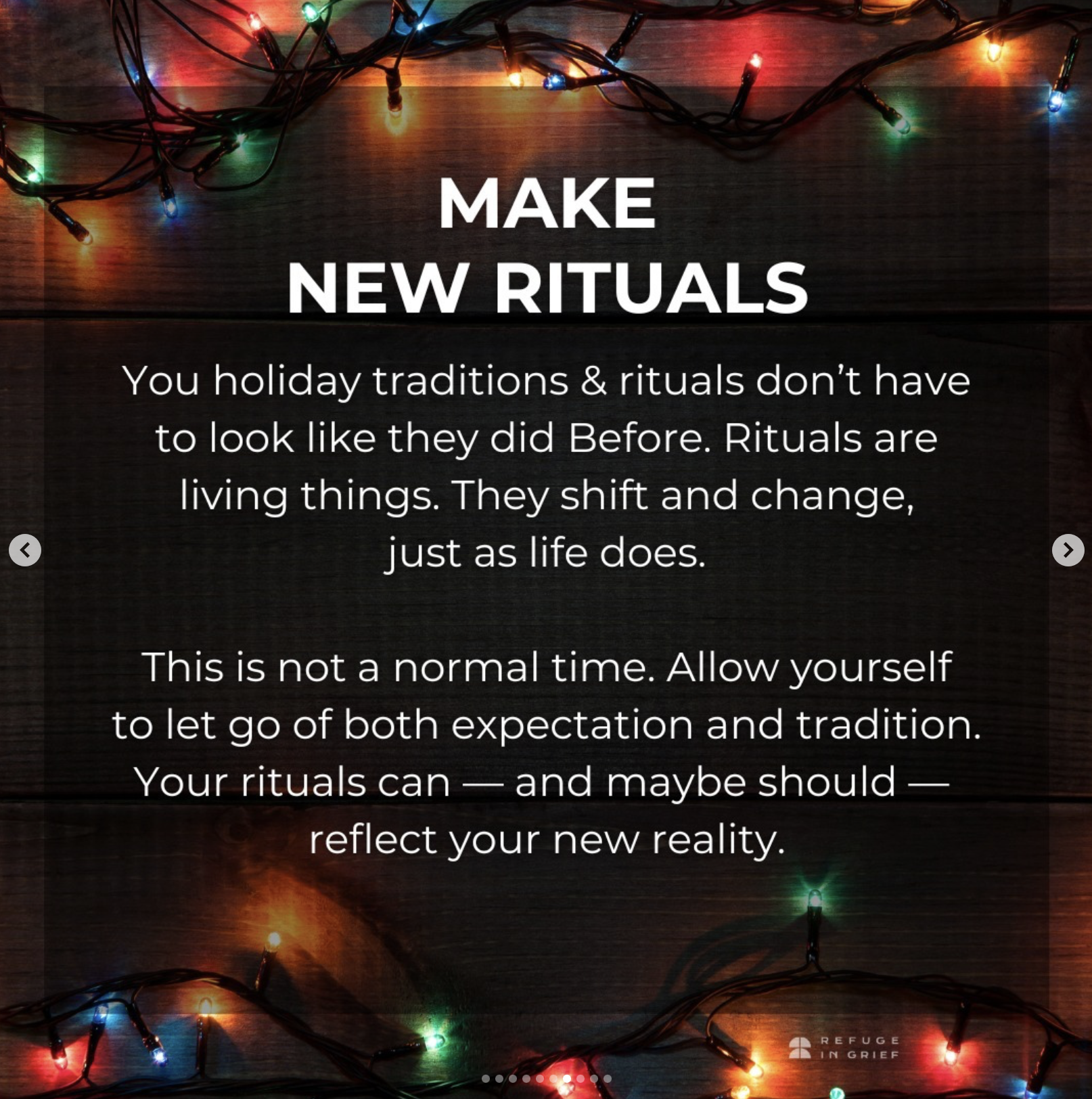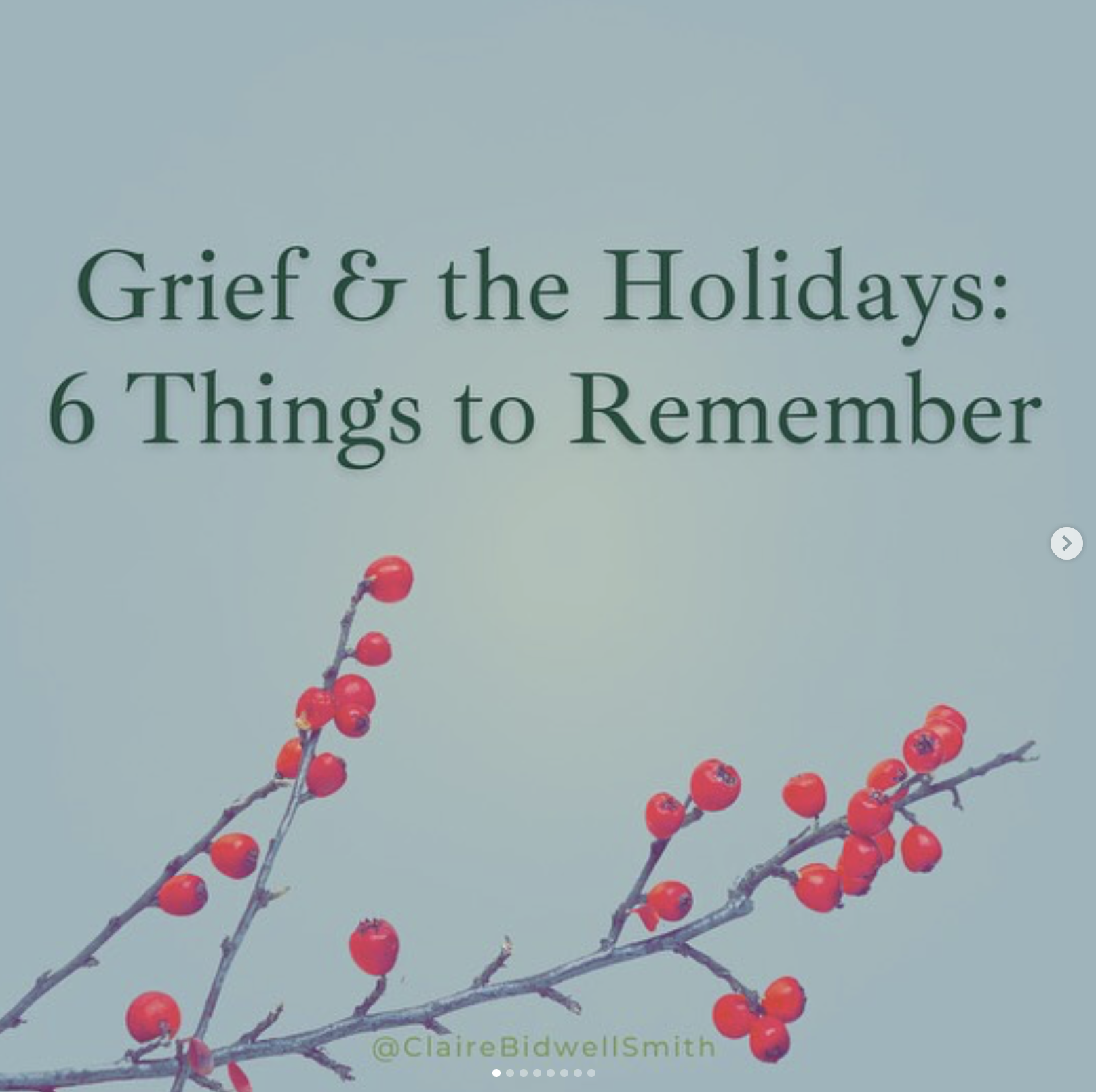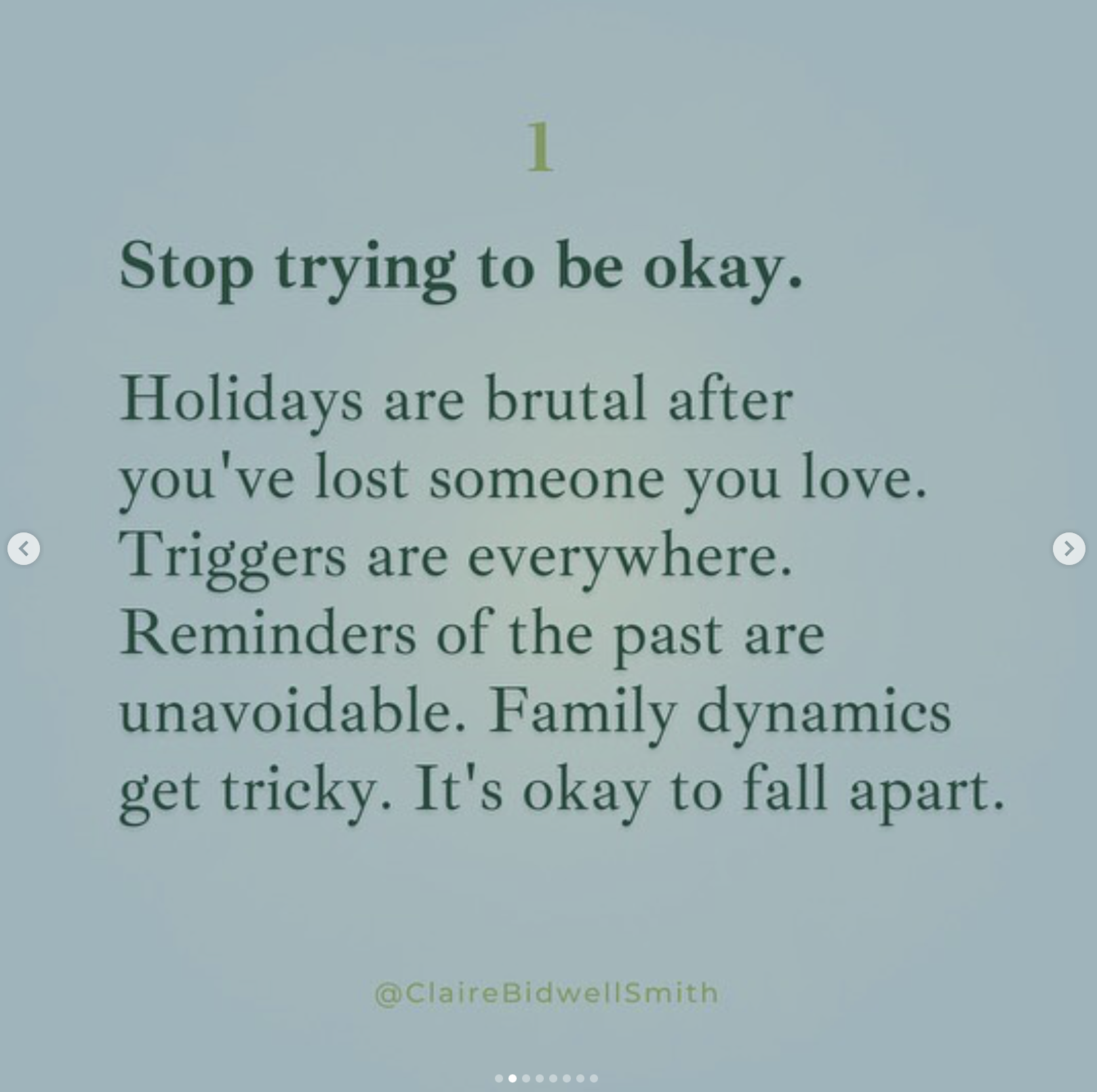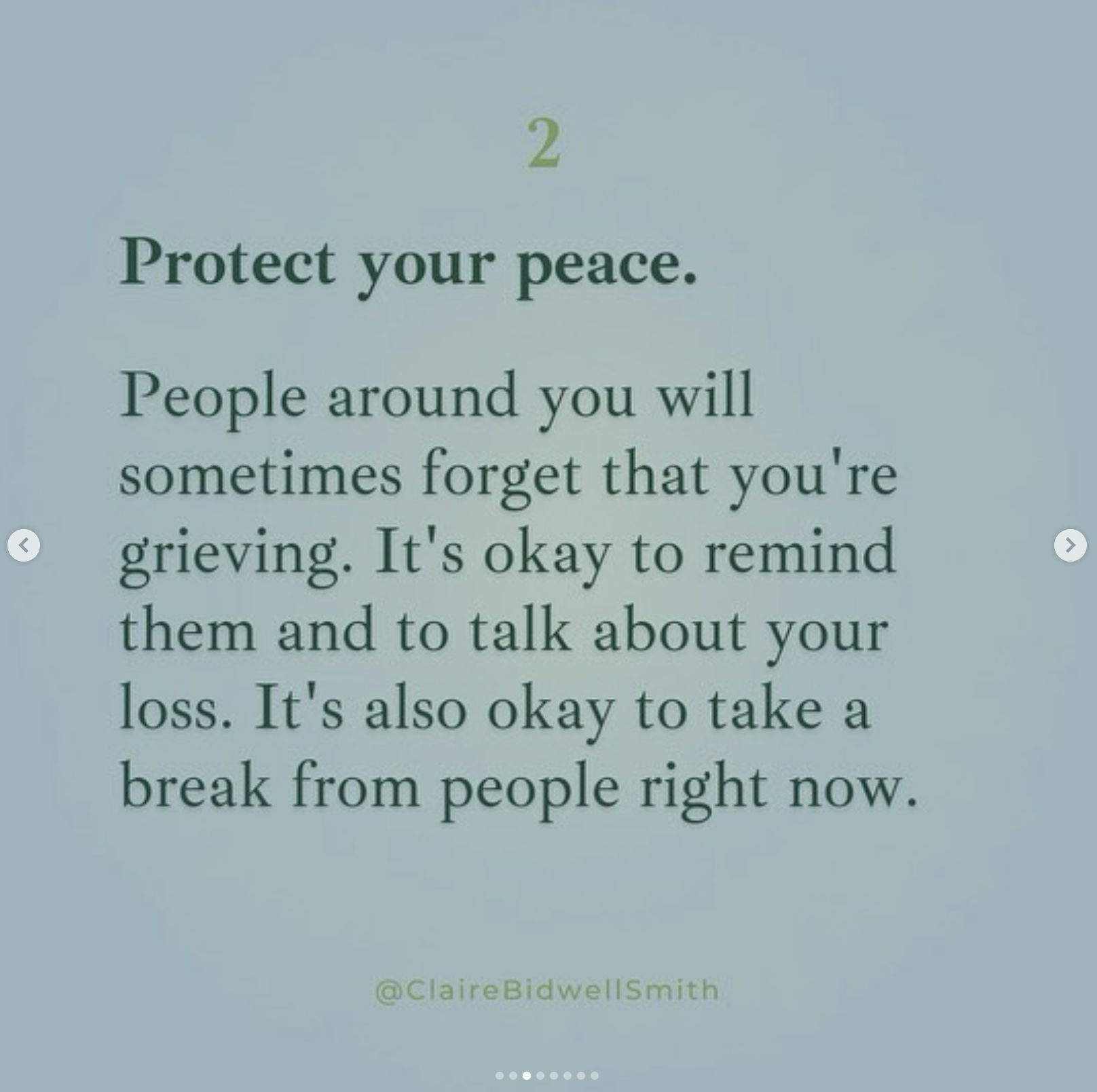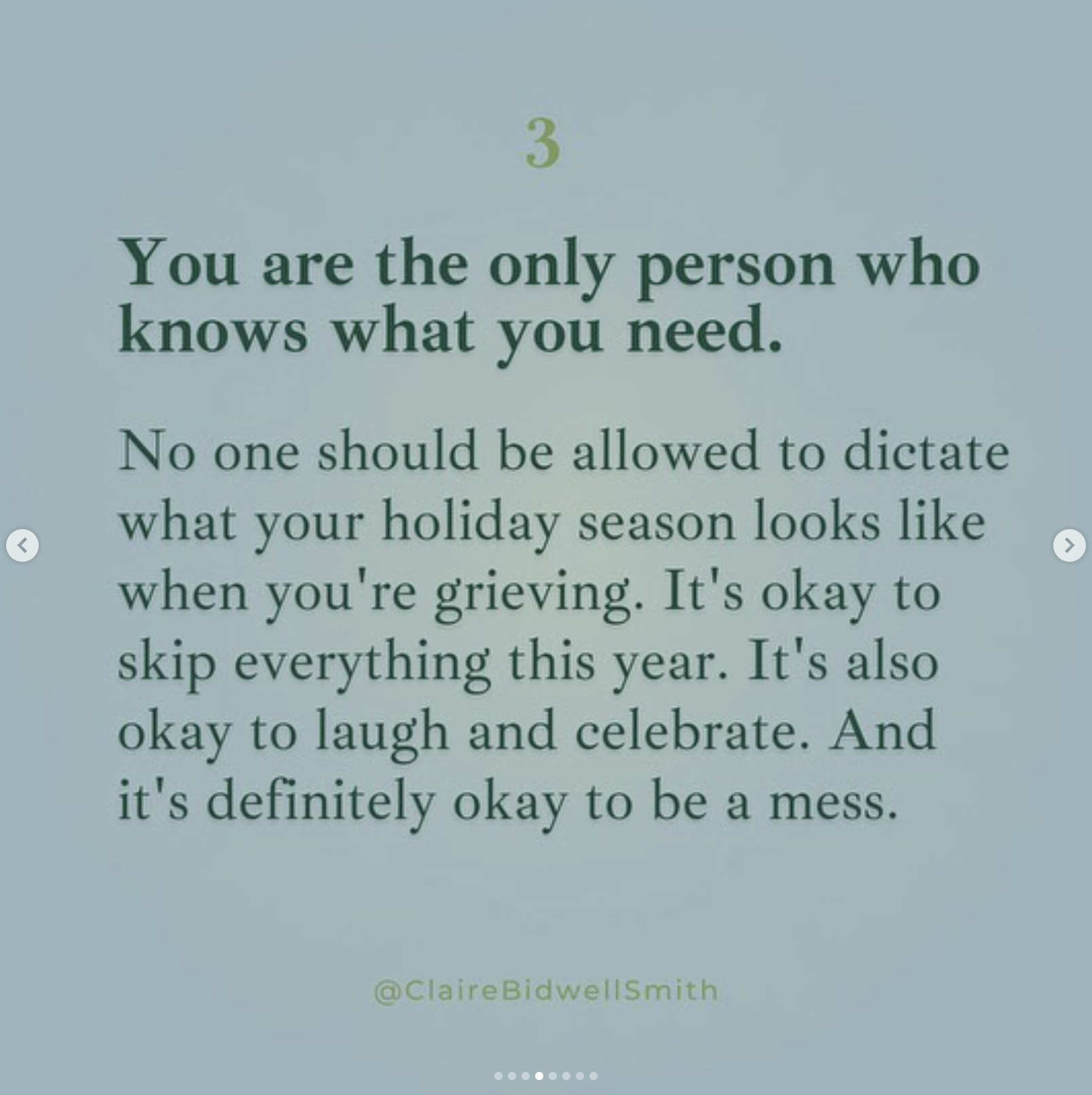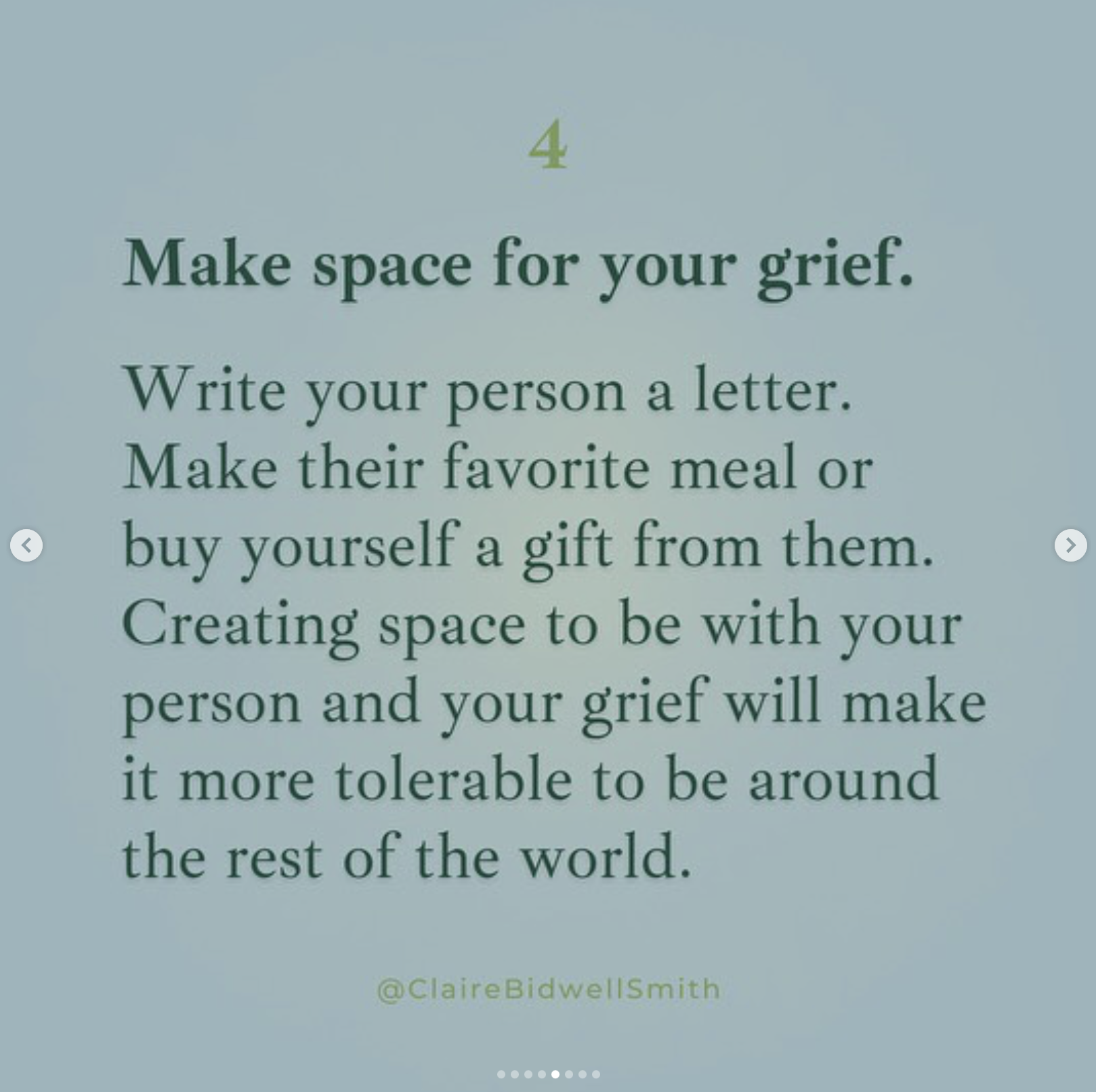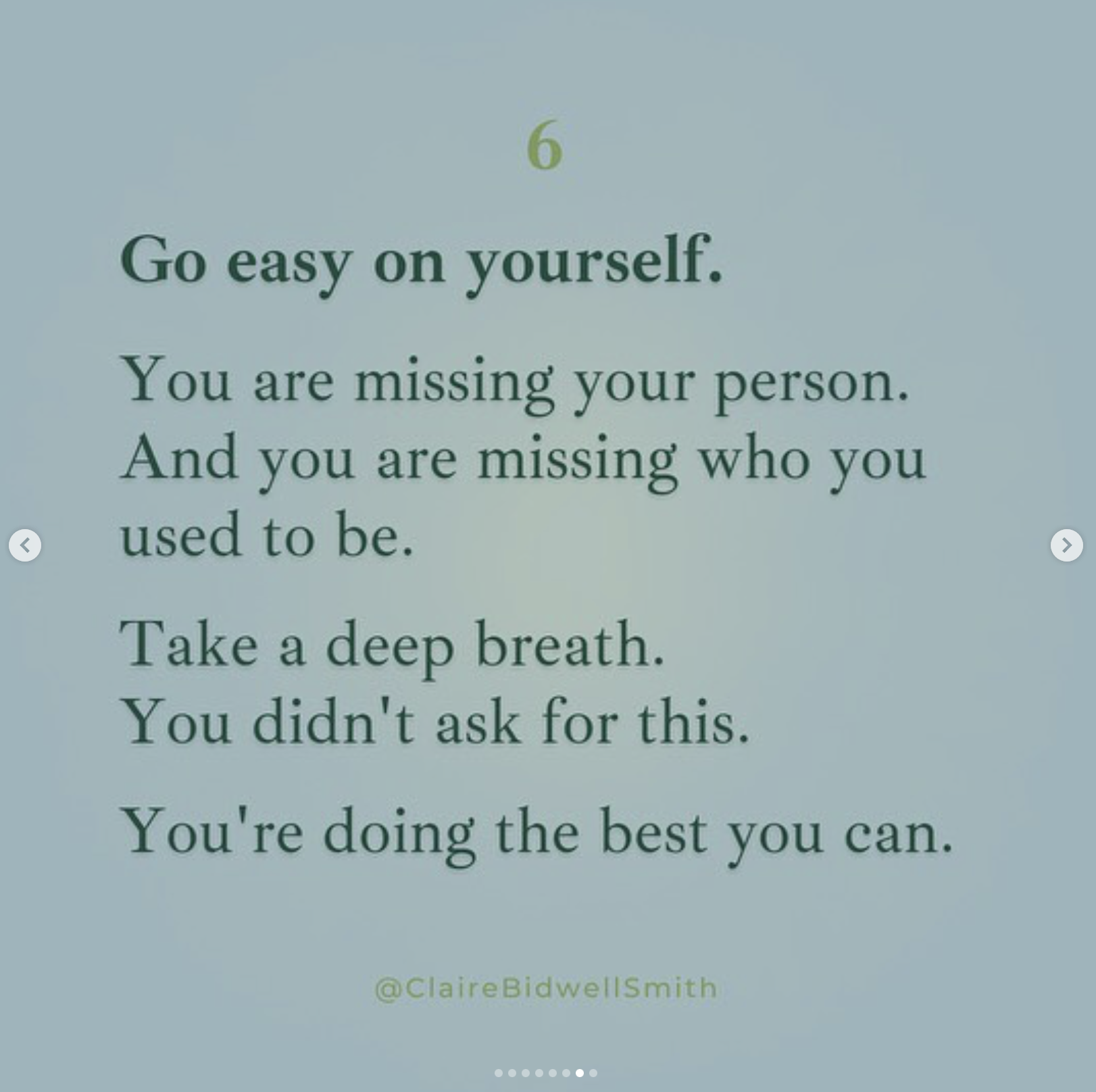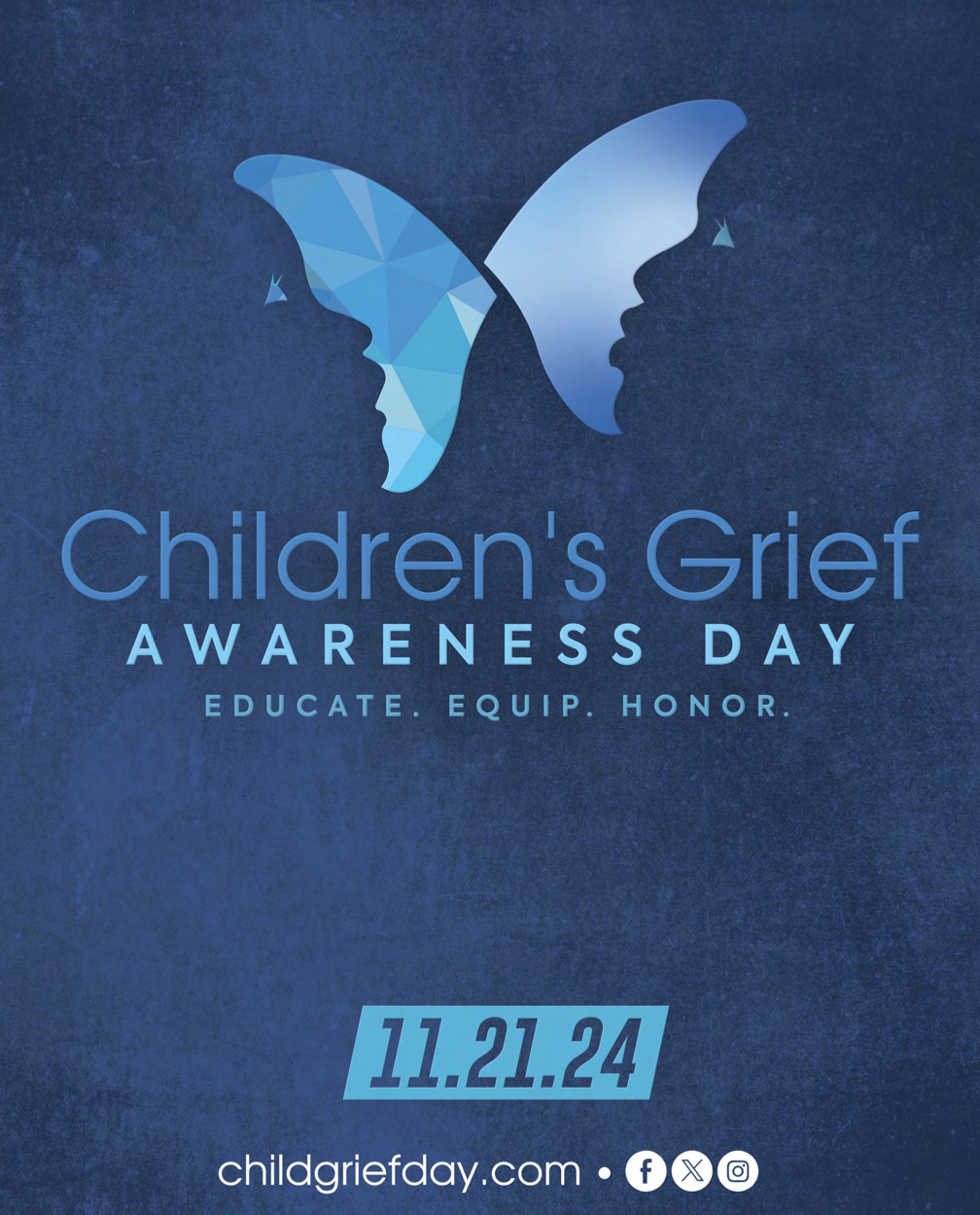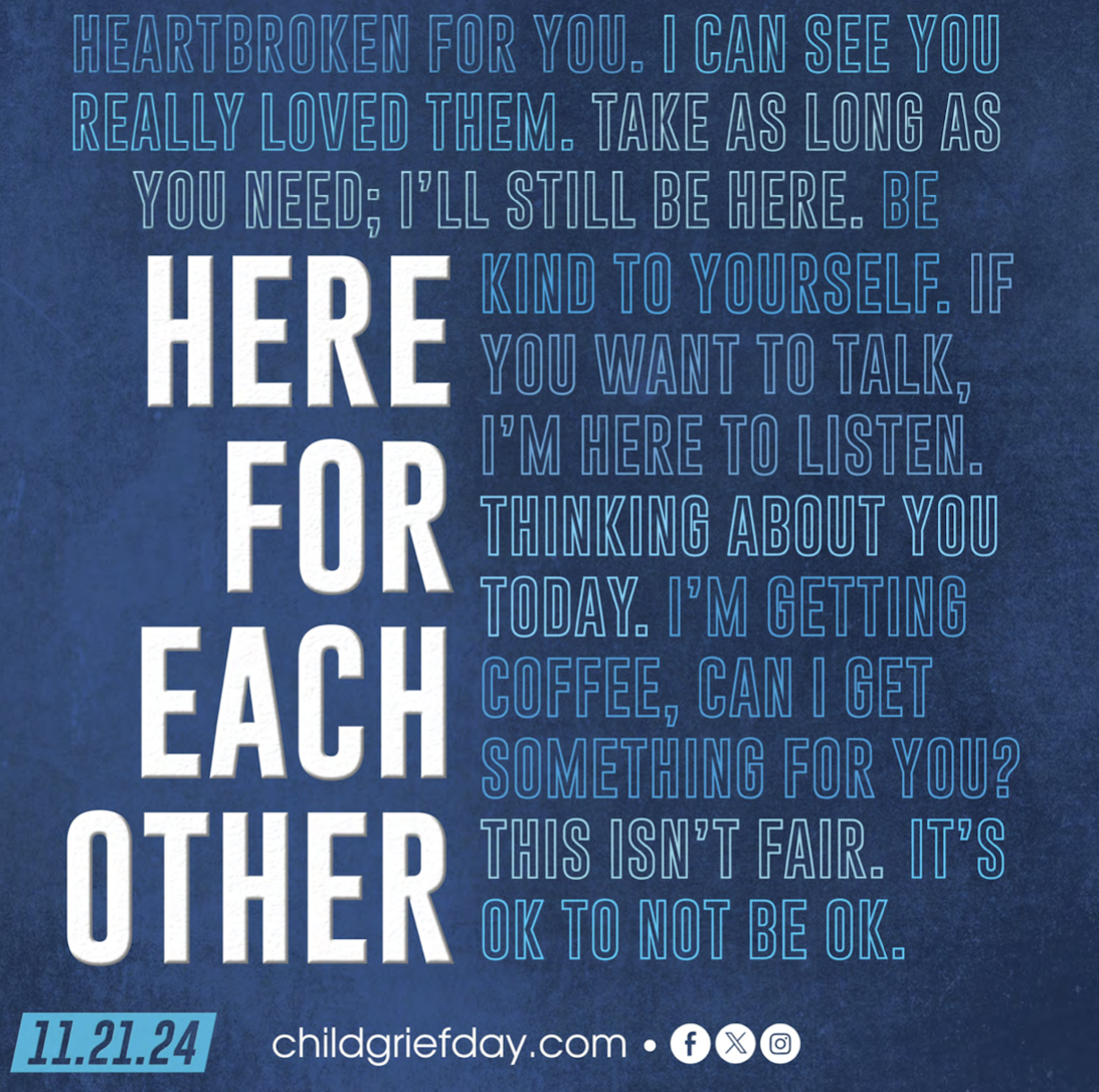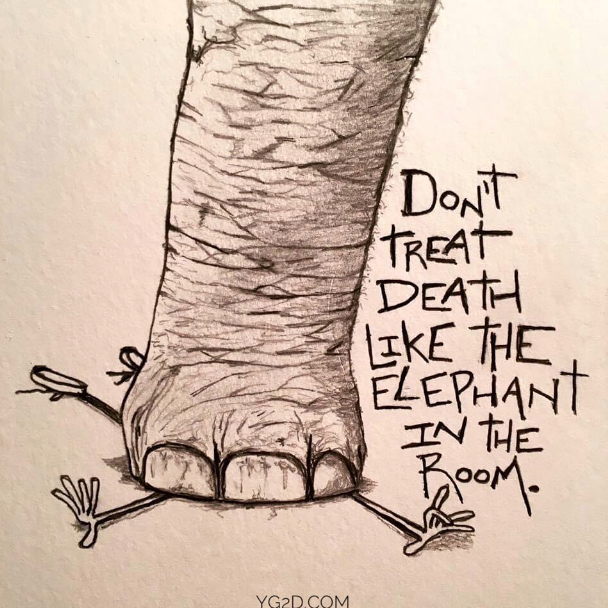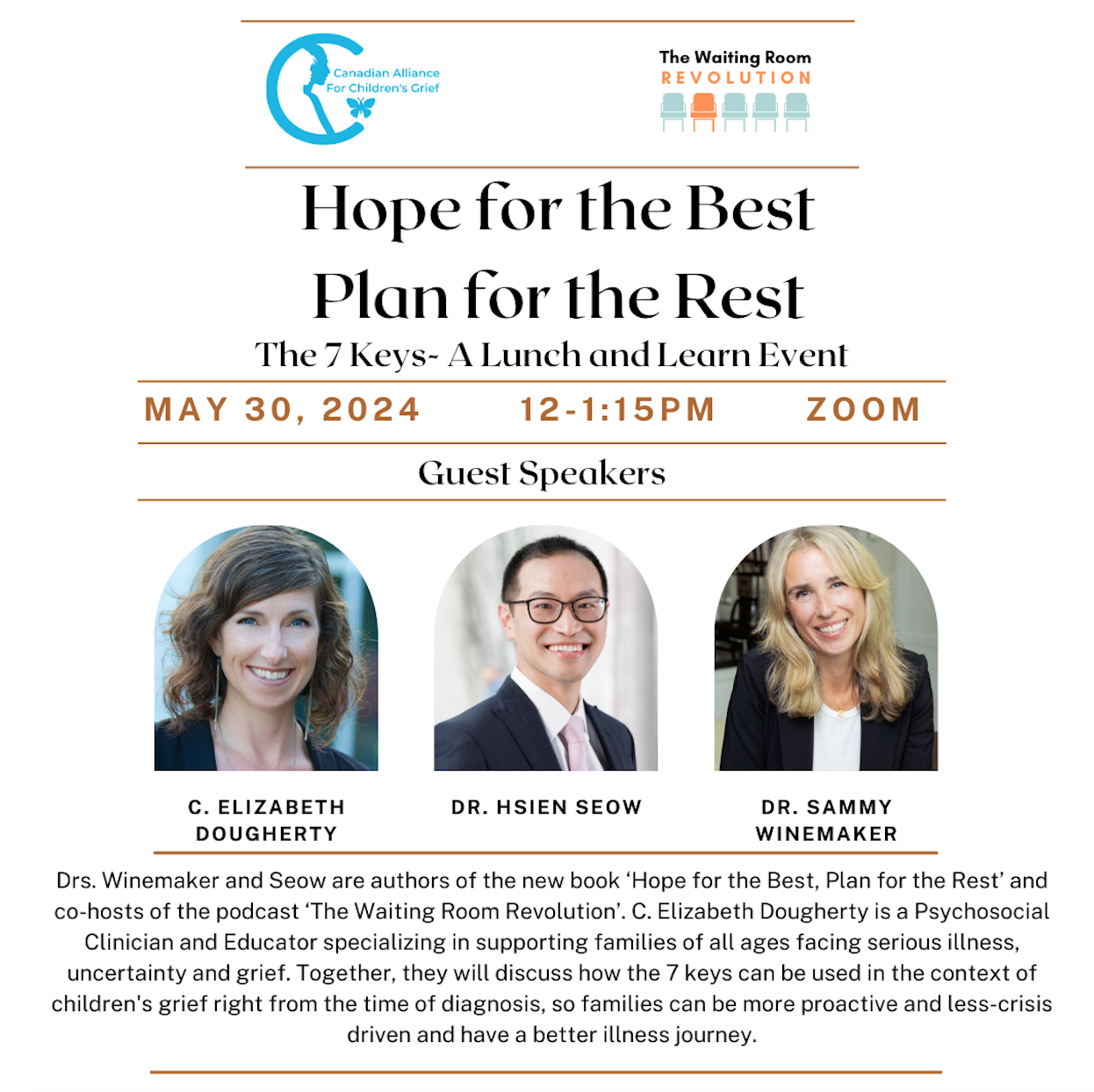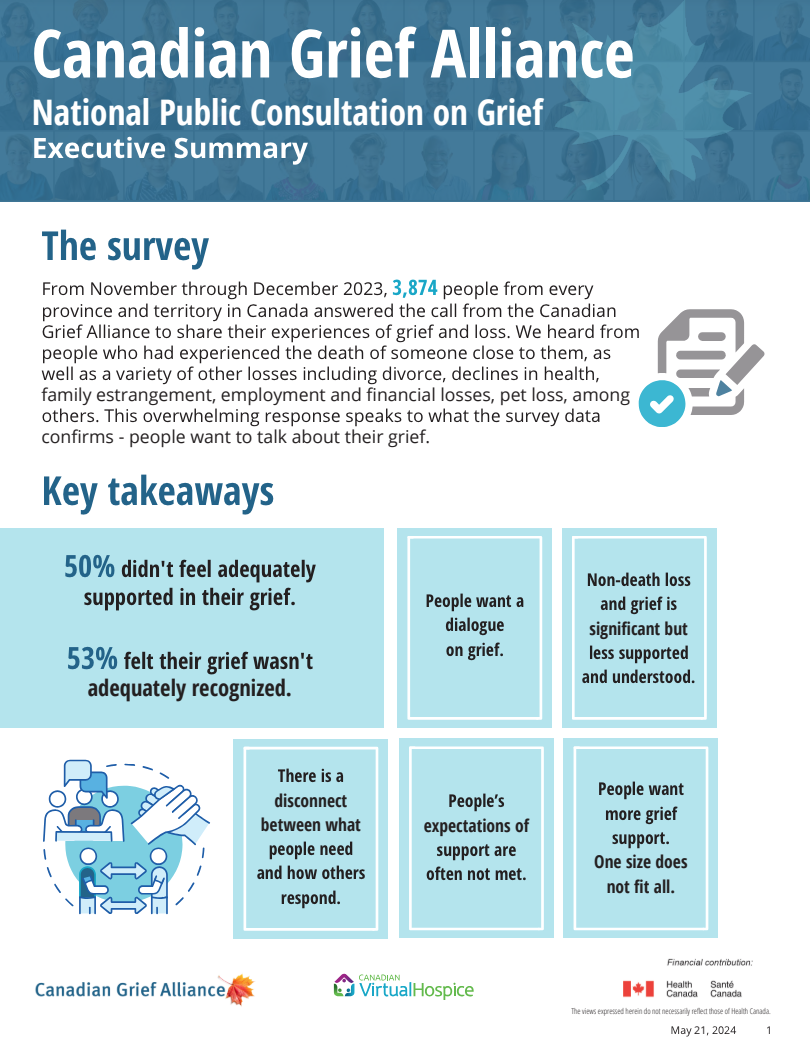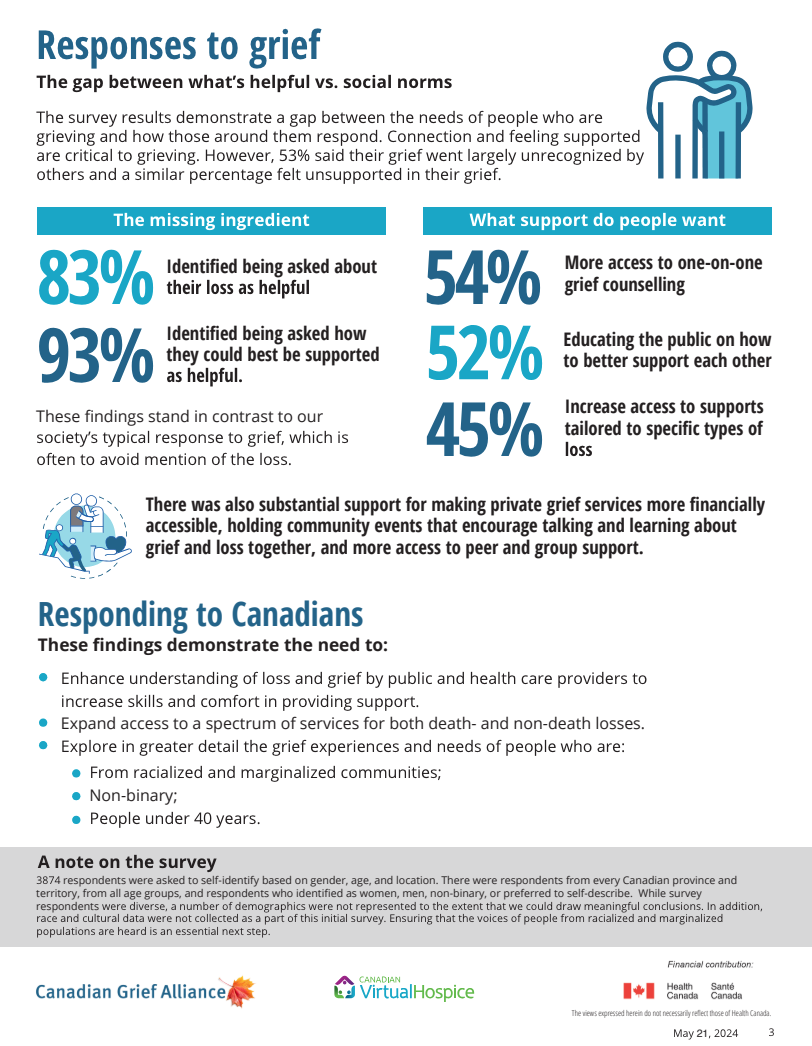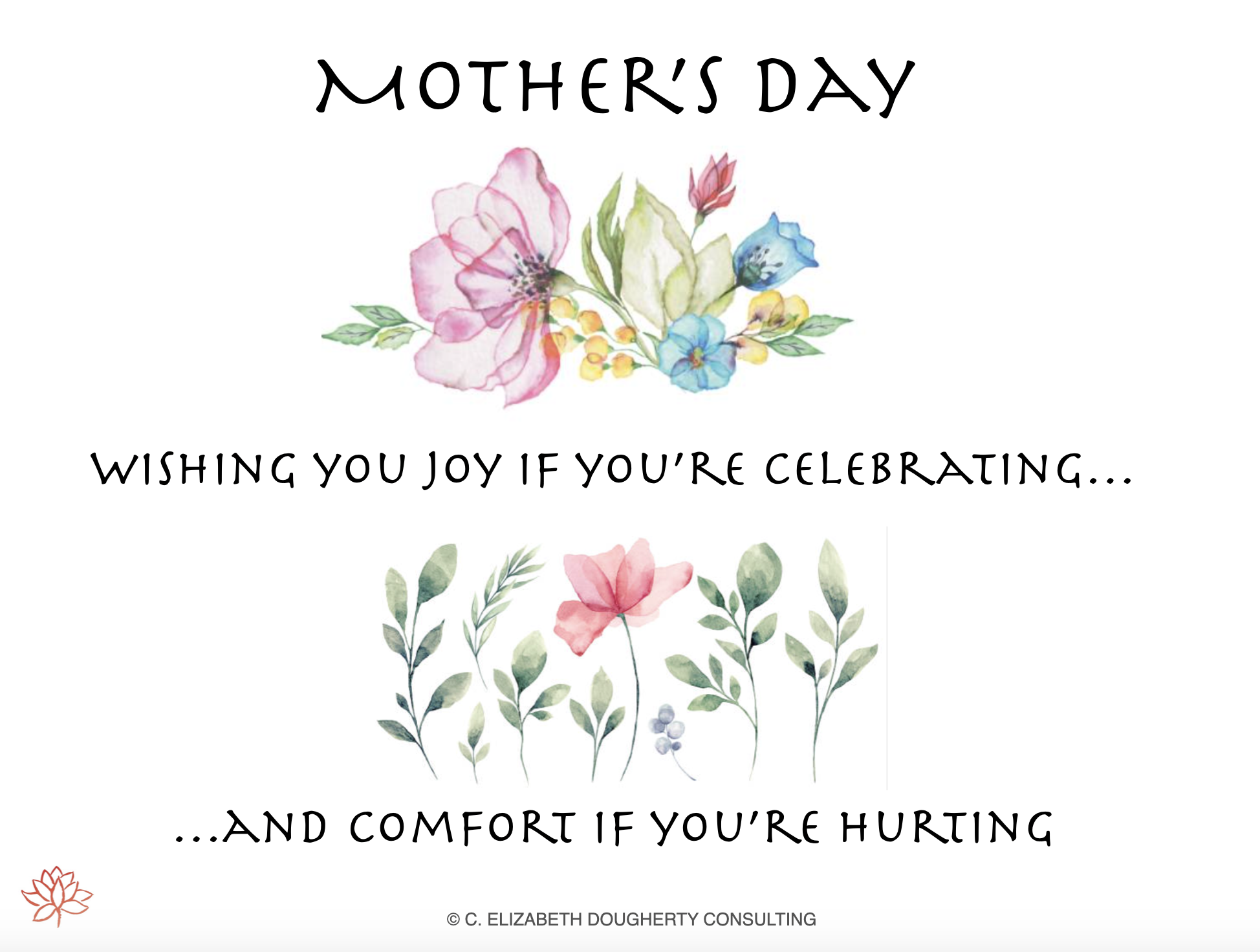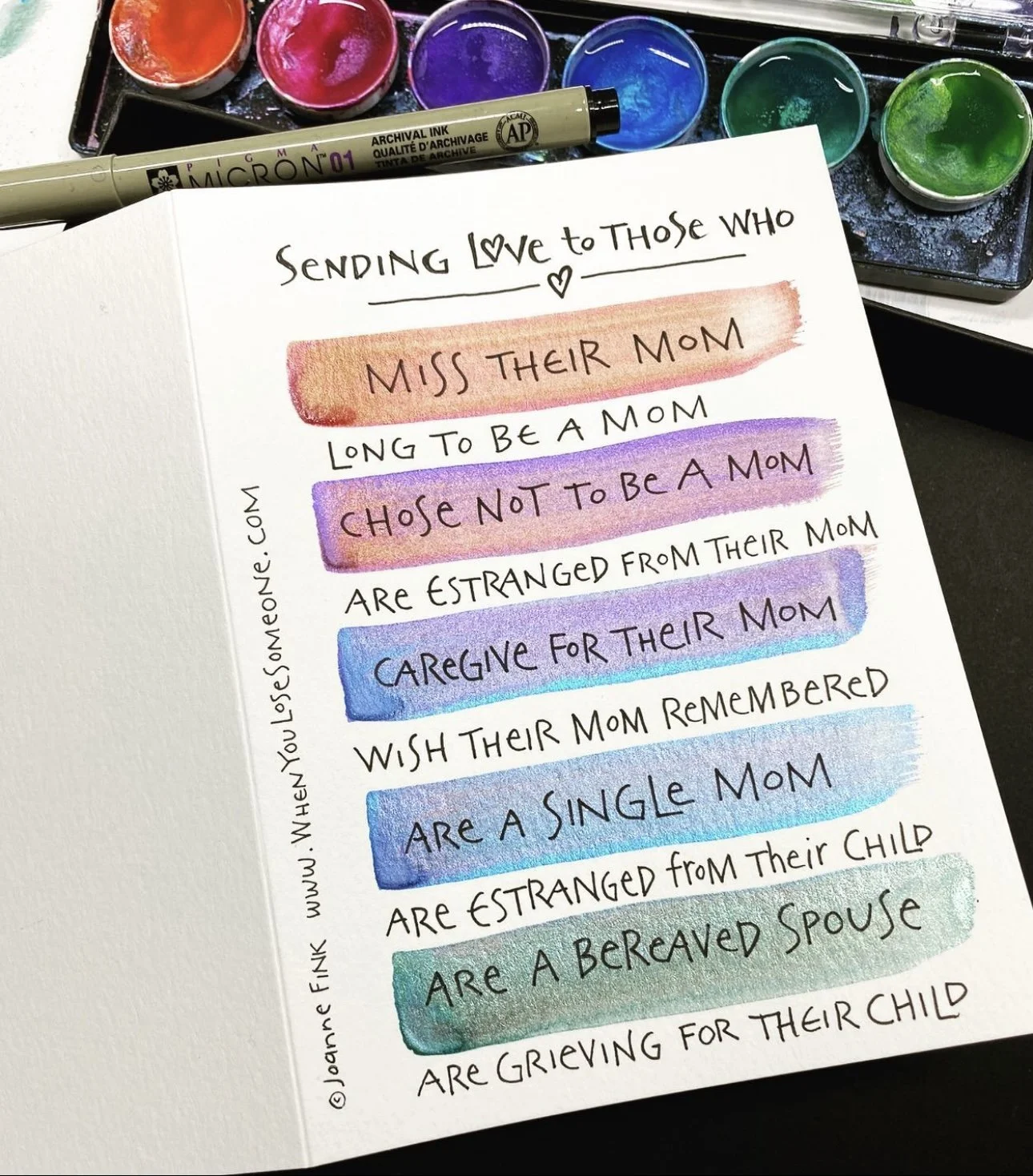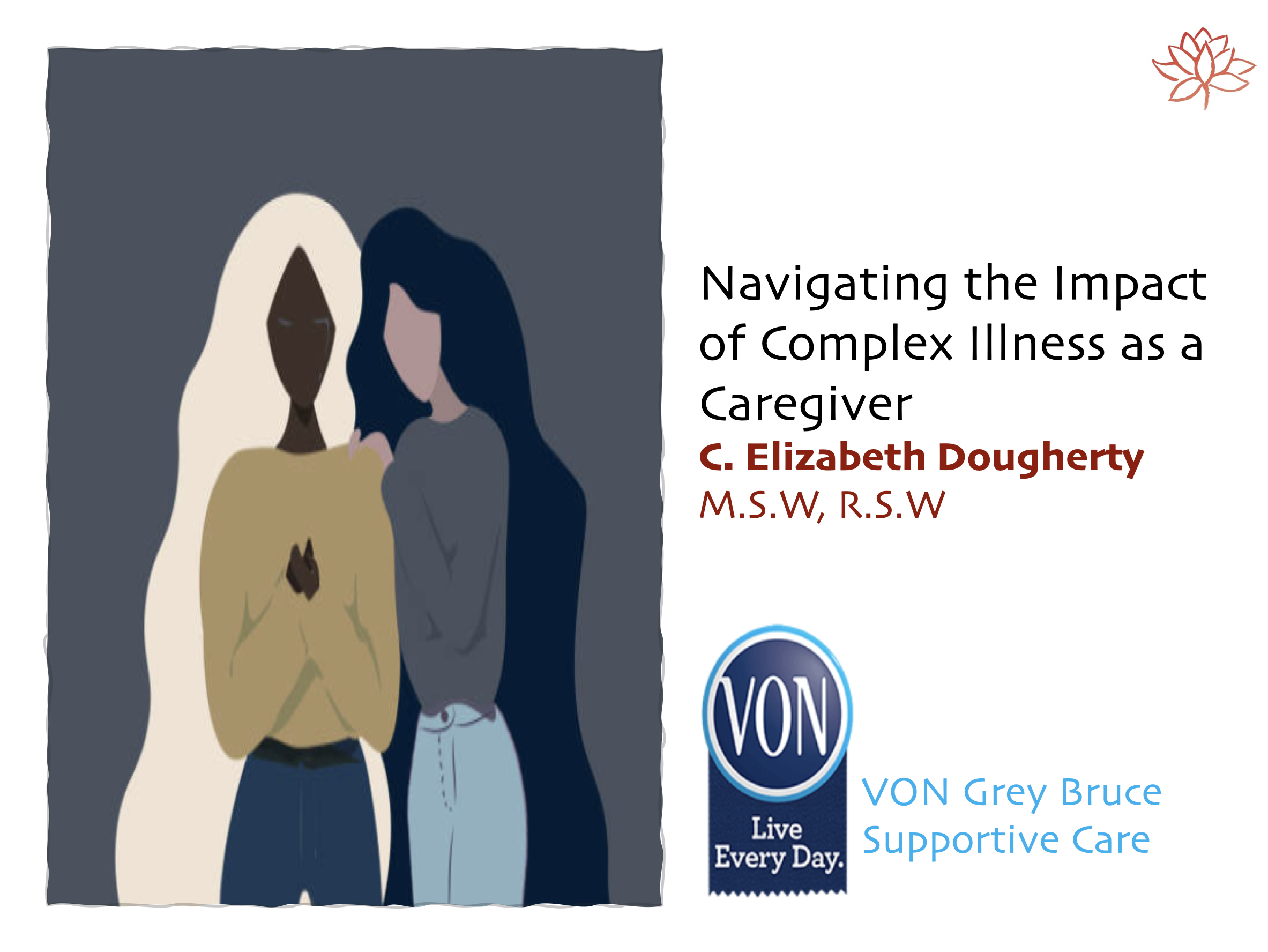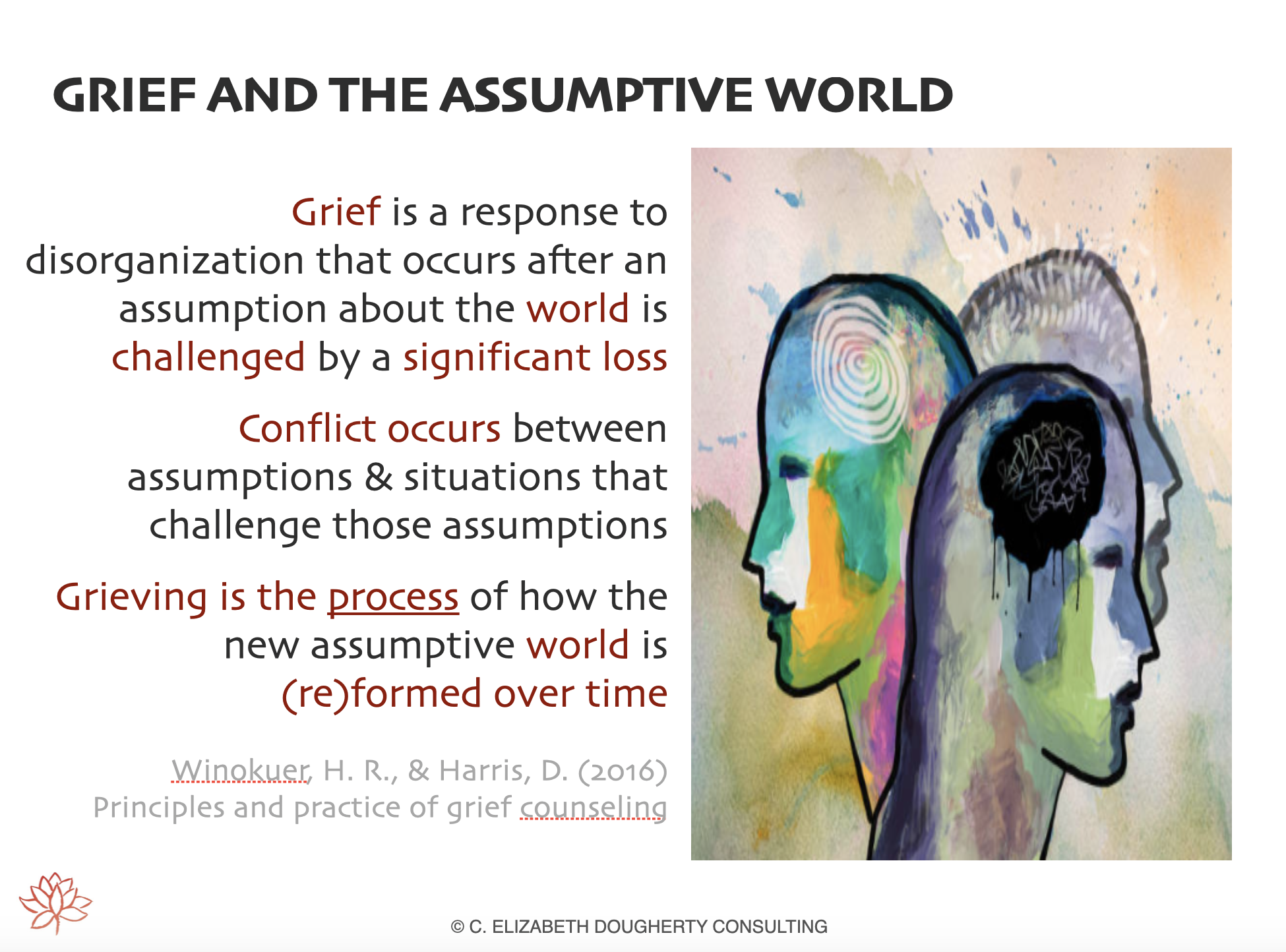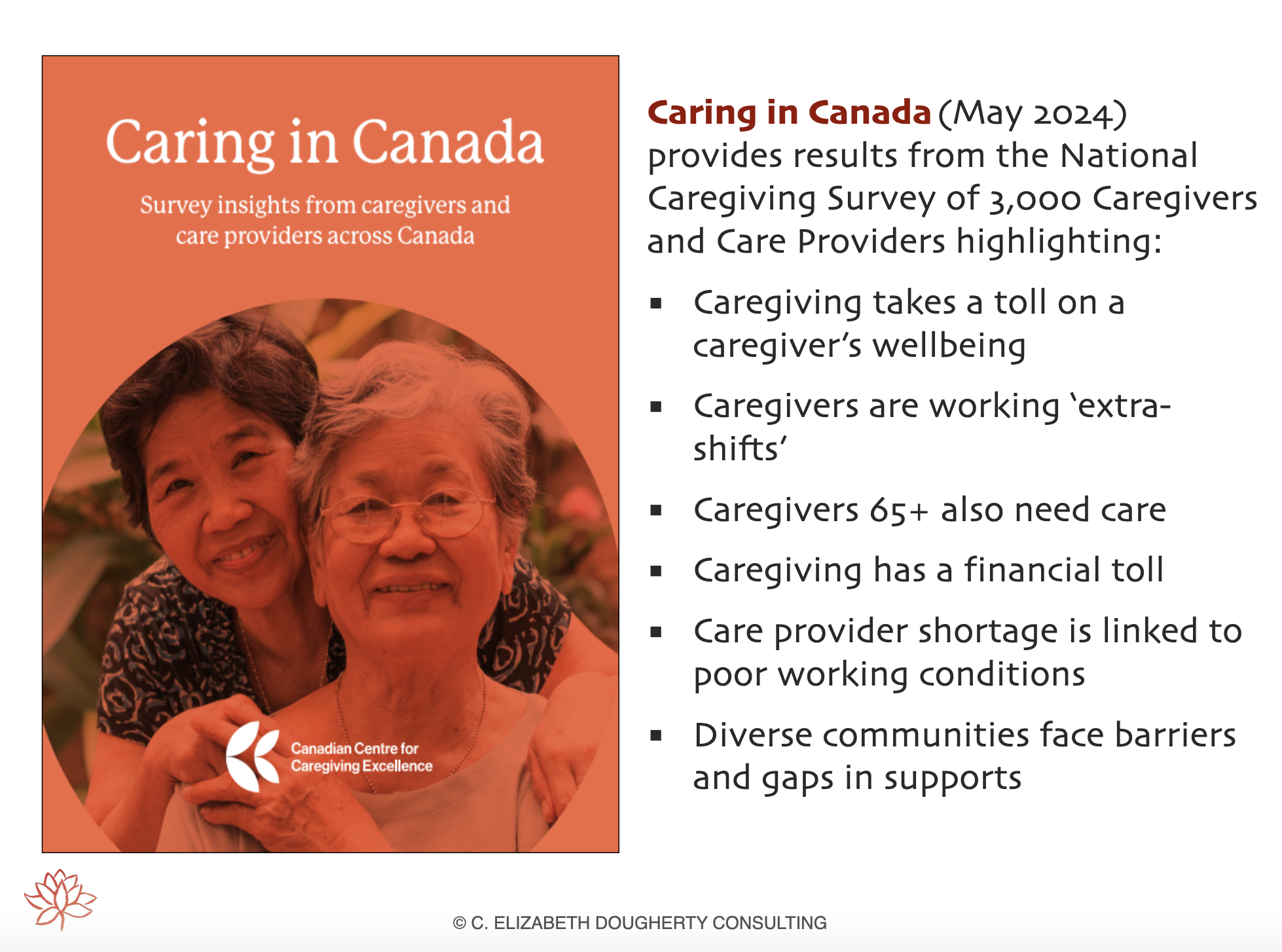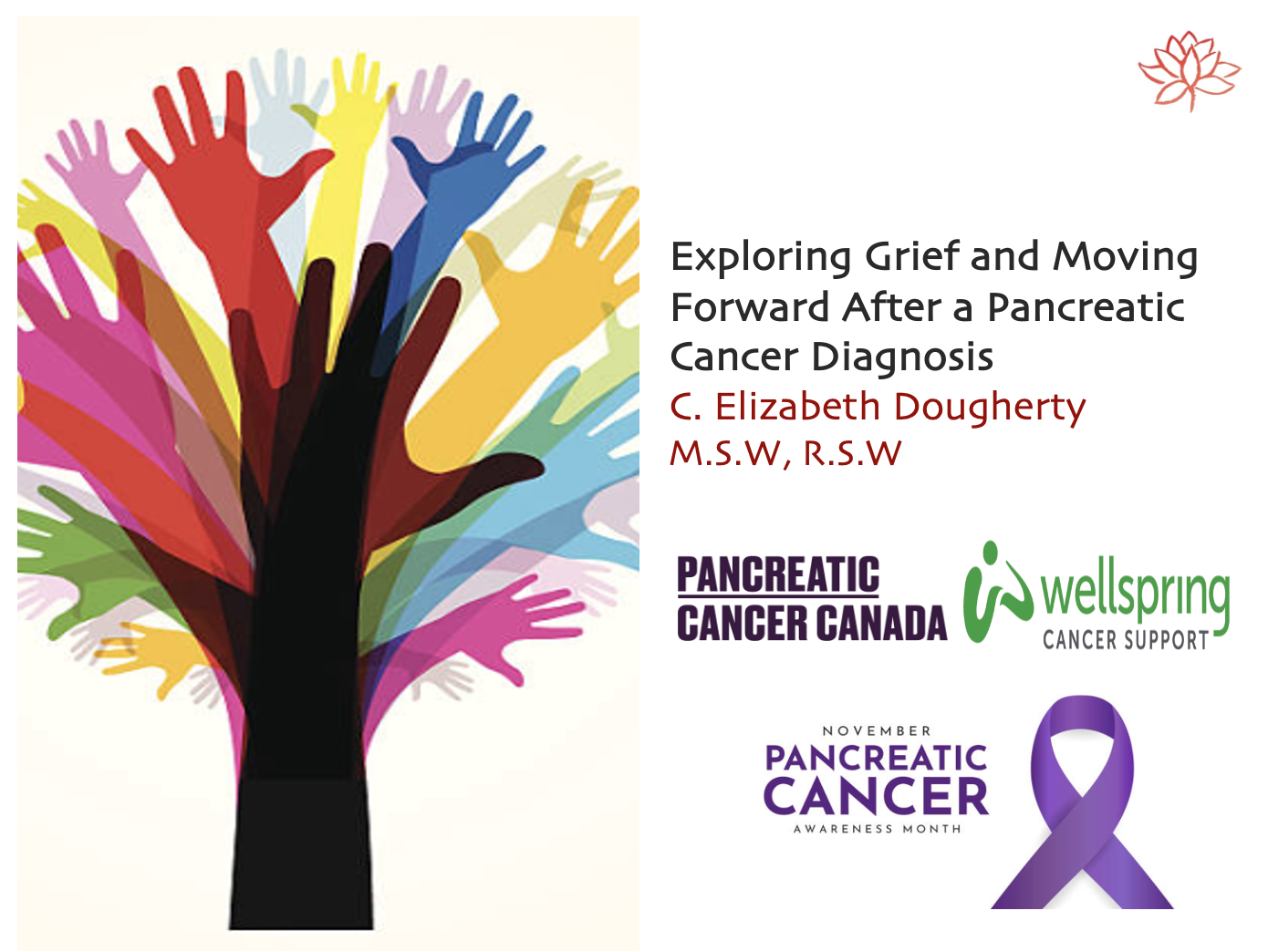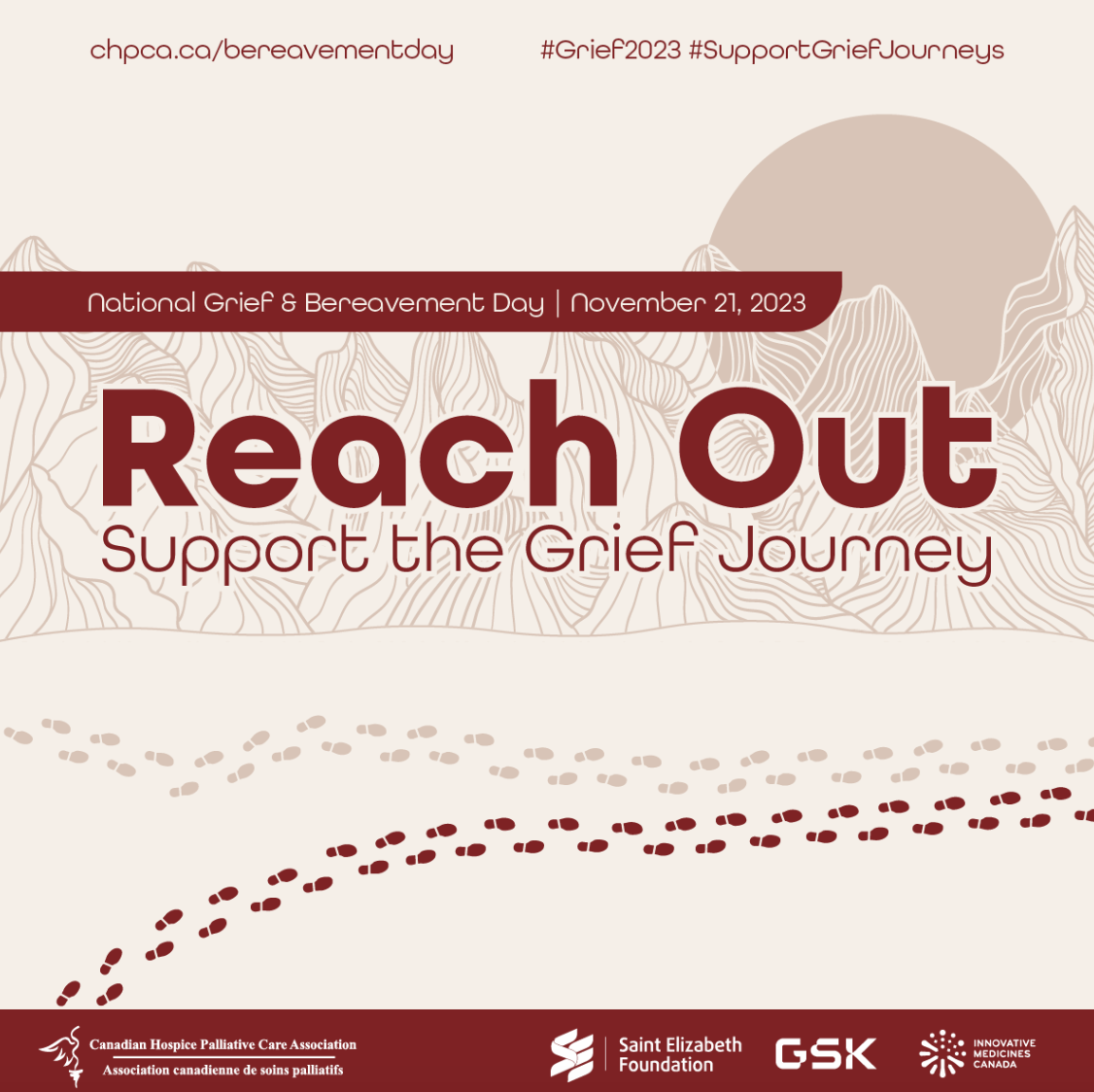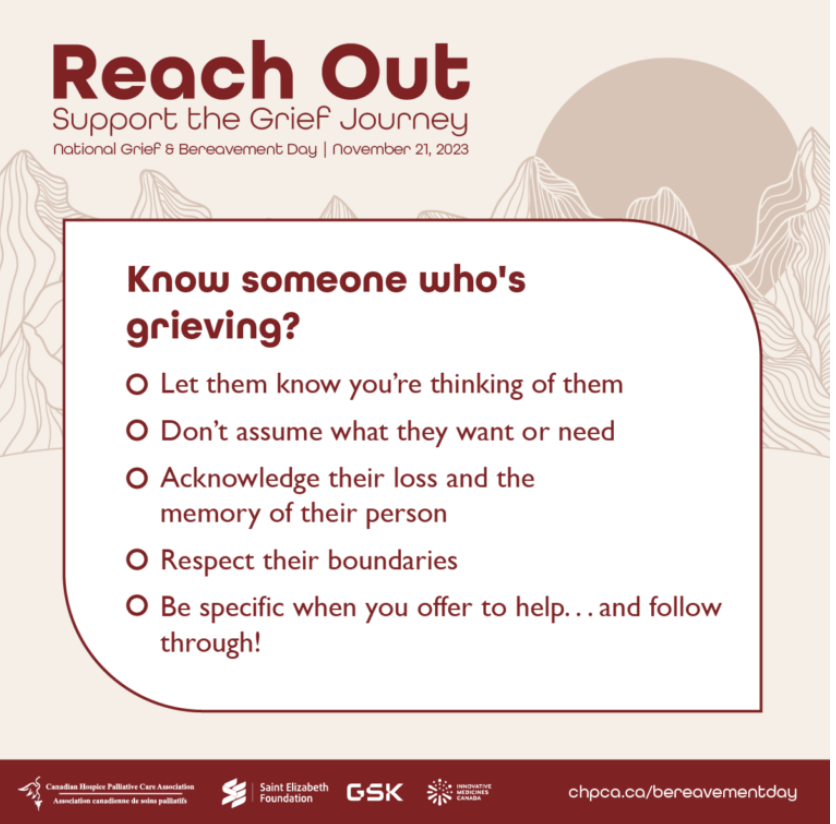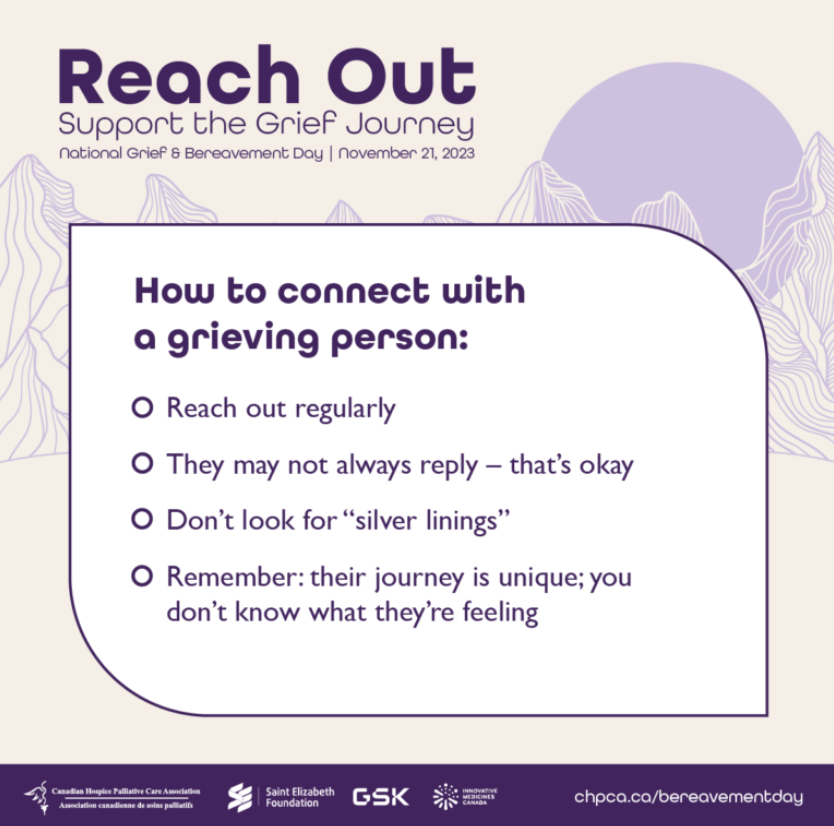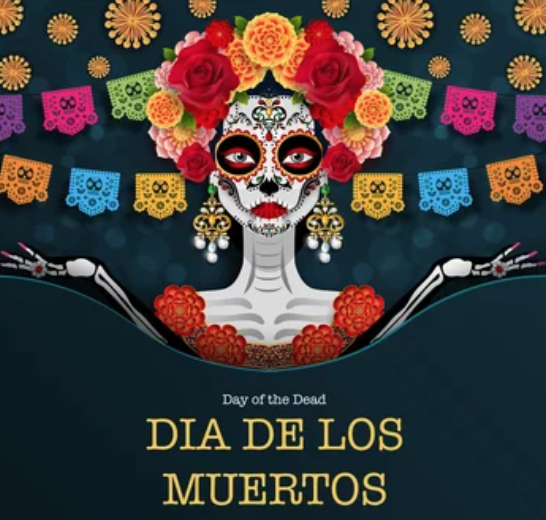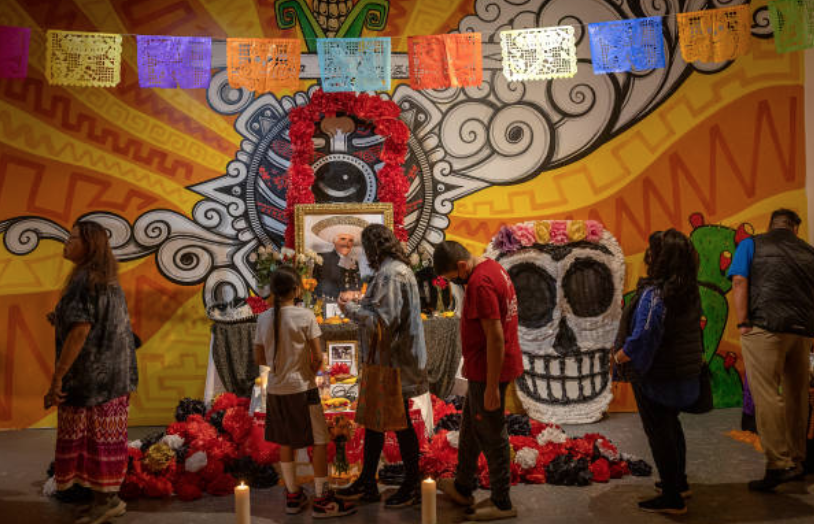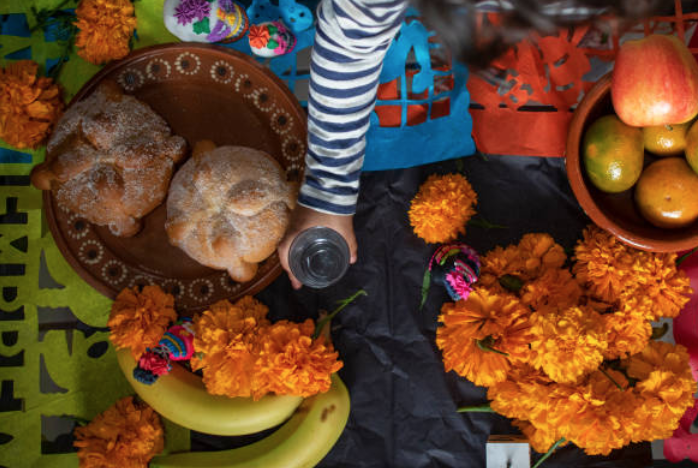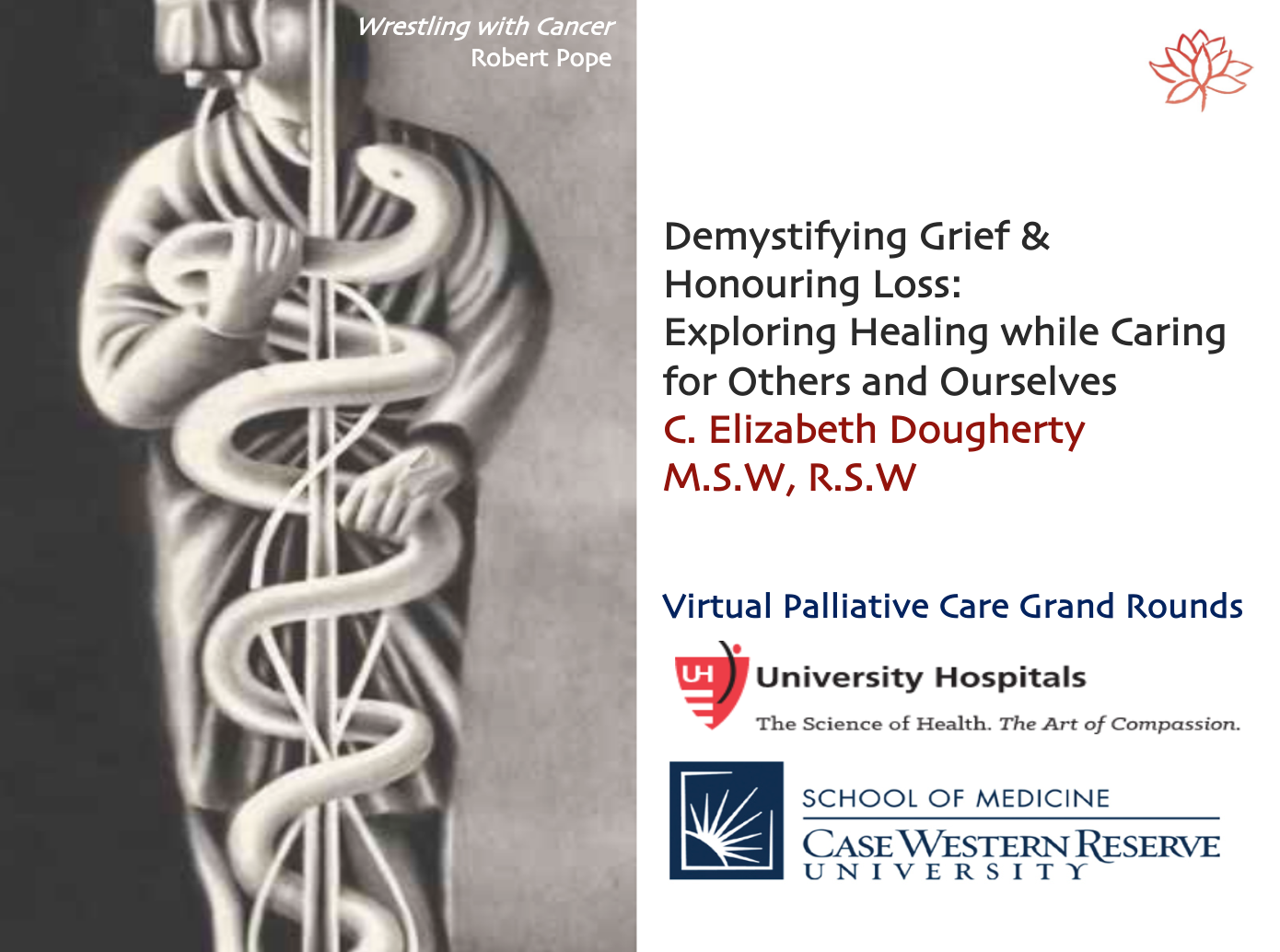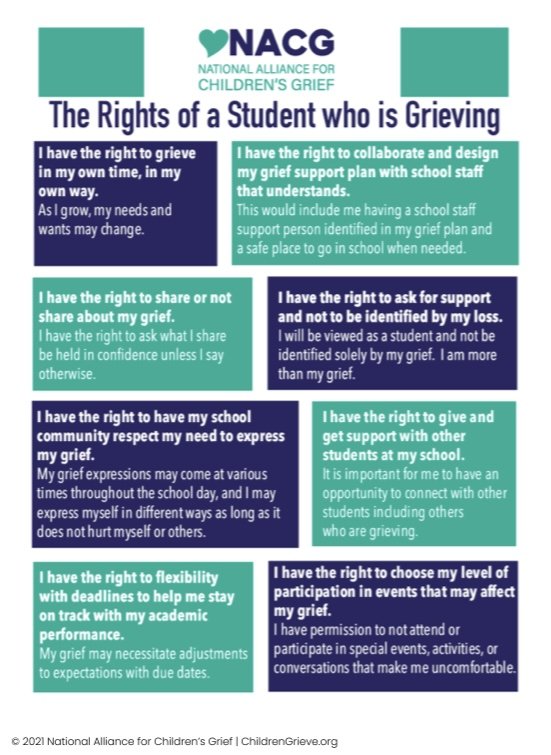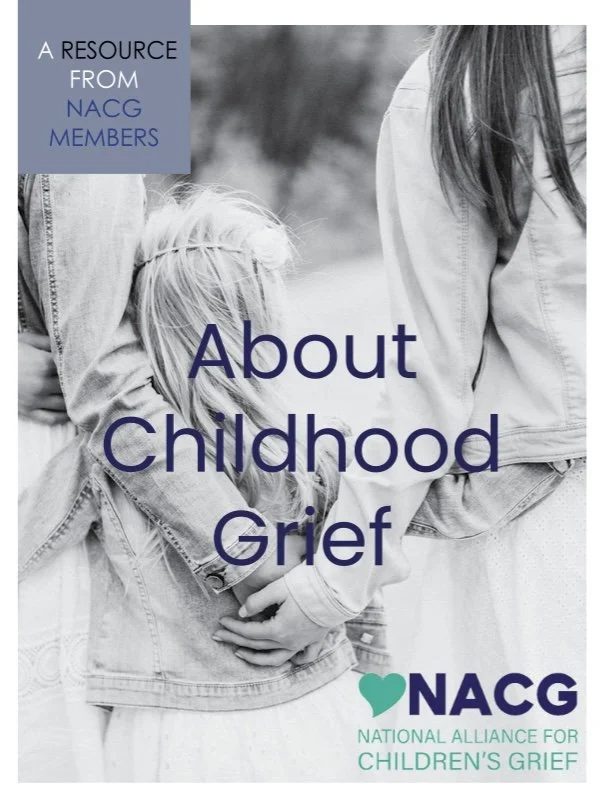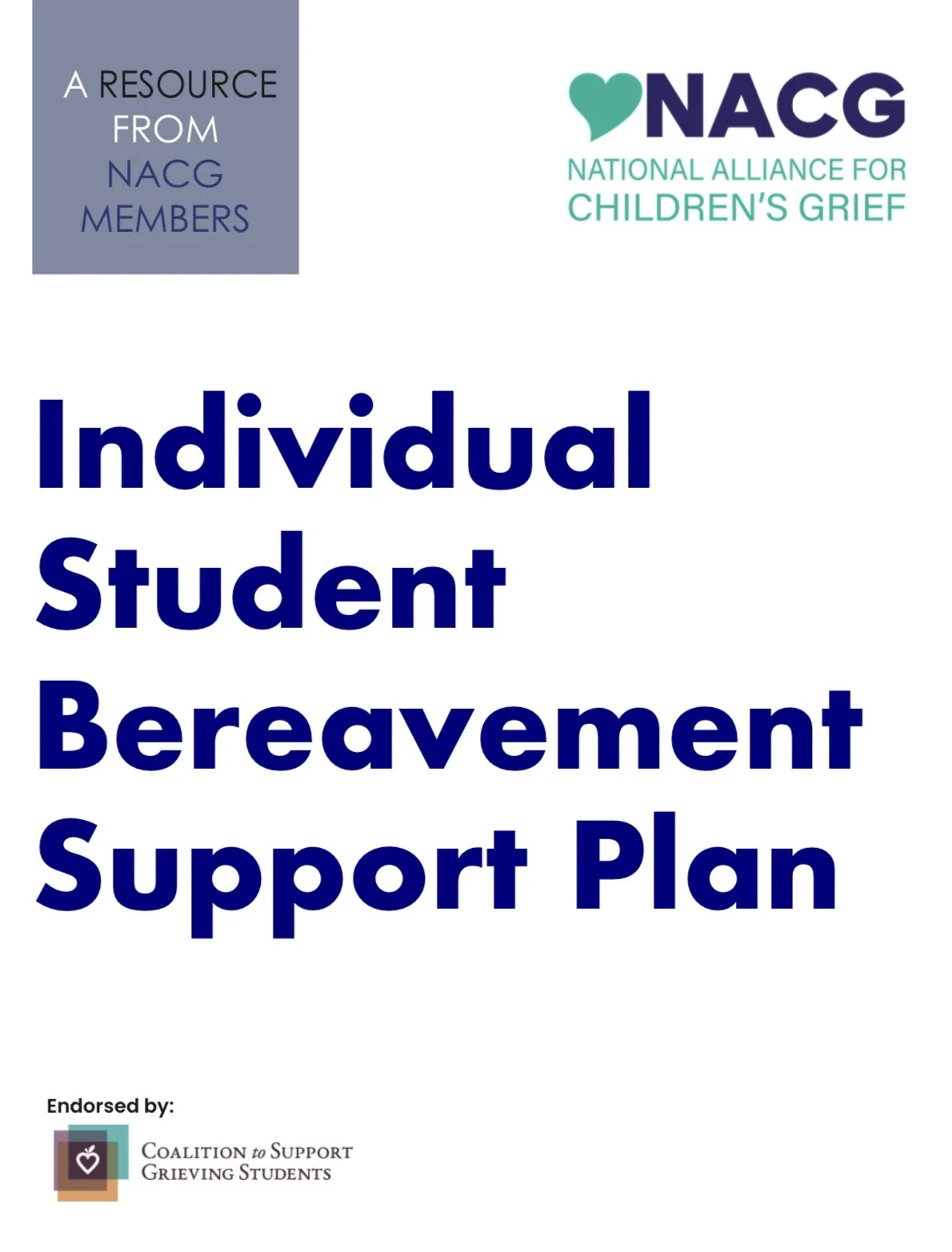Holiday Limits, Boundaries and Self-Compassion Reminders" via What’s Your Grief (WYG). Visit Archive for the Holiday Season via WYG
How to Survive The Holidays When You're Grieving
How to Survive The Holidays When You're Grieving via Megan Devine
"The holiday seasons adds an extra measure of pain to people already bearing more than they can, more than they should ever have to. There is the empty seat at the table, the heaviness of all the ways the one you love is missing, traditions that have gone flat, smacking against the empty place.
Death, illness, massive life events — they all sour the season in ways those outside your loss can’t understand. Given that this season is going to be rough, how will you survive? Here are some of my holiday survival rules from my own early days. Remember, whatever you choose to do (or not do) this holiday season, staying true to yourself is important.
If you have someone who consistently tries to talk you out of your 'no,' you might respond by calling them out on their coercion: 'I keep telling you no, and you keep trying to convince me that I’m wrong. I need you to respect my decision.' Friends and family get to feel disappointed in your no, but they don’t get to force you to say yes.
Whether you are missing someone who should be part of the festivities, or you are missing someone who shared your love of quiet acknowledgment over raucous partying, this season will likely add to your grief.
Companion yourself. Care for yourself. Listen to yourself. Reach out where it feels good to reach, curl in when that is what you need. Make this season as much of a comfort to yourself as you can.
May your holiday season (or non-holiday, depending) be as safe, and full of love and connection as it can be.”
Visit refugeingrief.com for more Grief Support.
Grief & the Holidays: 6 Things to Remember
In the midst of the focus on joy & cheerful celebrations at this time of year, sharing a reminder of "Grief & the Holidays: 6 Things to Remember" via Claire Bidwell Smith
Children's Grief Awareness Day is observed on the third Thursday in November
Children's Grief Awareness Day is observed on the third Thursday in November. This time of year is a particularly appropriate time to support grieving children and youth as the holiday season is often an especially difficult time after a death.
Children's Grief Awareness Day brings attention to the fact that support can make all the difference in the life of a grieving child or teen. It provides an opportunity to raise awareness of the painful impact that the death of a loved one, with an opportunity to make sure that grieving children and teens receive support they need.
Children and youth who have experienced the death of someone important to them often feel isolated, like their struggles are invisible to those around them. Grieving children and teens need advocates and allies navigating supportive ways to move forward. Every school and community has children and teens who have experienced loss. Children’s Grief Awareness Day is about recognizing that no young person should have to navigate grief alone.
We raise awareness so that people will understand that a grieving child or teen can't just "get over it”, not in any set time period, not by any act of their own will - and that there's no reason they should just "get over it. We can ensure children and youth feel seen, heard, and understood with the right tools, compassion and support.
Source: Children's Grief Awareness Day
National Grief & Bereavement Day is November 19th
Remember. Reflect. Connect. National Grief and Bereavement Day is November 19, 2024. It is time to reflect and take action, creating connections while navigating grief.
The third Tuesday in November marks the annual National Grief and Bereavement Day in Canada. On this day, CHPCA encourages Canadians to engage government and all sectors of Canadian society in a national dialogue to identify and support access to the necessary resources for those living with grief and bereavement.
Grief can make us hesitant to connect with those around us, whether we are the person grieving or someone around them. When someone we know is faced with grief, we can often find ourselves at a loss for words. When we are grieving ourselves, we may not know what support we need.
Grief is Universal. Grief is a common experience we will all share, yet it can often leave us feeling disconnected. We might feel disconnected from our loved ones, from our friends, or from who we used to be.
Finding connection through loss can be a powerful tool to help us move forward and through grief. Something as simple as a phone call, someone reaching out, a hug, a prayer, or a treasured memory shared can bring much needed solace after a loss.
For more information, or to access a Grief and Bereavement Resource Repository, visit: https://www.chpca.ca/awareness/national-grief-and-bereavement-day/grief-and-bereavement-resource-repository/
Source: CHPCA
Demystifying Grief and Honouring Loss: Exploring Healing While Caring For Others And Ourselves
I am honoured to once again deliver the UGME lecture “Demystifying Grief and Honouring Loss: Exploring Healing While Caring For Others And Ourselves” to the Michael G. DeGroote School of Medicine at McMaster University.
Grief is simply one word that cannot begin to describe a universal, yet uniquely complex and deeply personal, series of life-changing events and losses while still finding ways forward.
Acute care hospitals focus on short-term episodic care & interventions and treatments aimed at cure, creating an environment where death is seen as a failure, or where death is denied. What does this mean when dying and death are inevitable?
It is so essential in whole person and *family-centred care, that we explore impact on the person and family, not just treat part of the body, or acknowledge a fraction of the medical event, or illness. This is true for all we serve, and this is also true for healthcare providers stepping forward to deliver care who are deserving of care and support for themselves.
What does it mean to explore and honour grief for anyone facing trauma and loss stemming from acute medical events, complex illness, dying, death, bereavement - for any person and family, AND the healthcare providers caring for them?
A reminder, while largely stigmatized and misunderstood, in the words of Dr. Kenneth Doka,
“Grief is a reaction to loss. We often confuse it as a reaction to death. It’s really just a very natural reaction to loss. When we lose any significant form of attachment, grief is the process of adjusting”
Grief is a process, a uniquely personal ongoing process.
Grief can fracture one’s entire world, temporarily, or permanently.
Following an acute medical event, or a diagnosis, grief can fracture identities, hopes, routines, connections, sense of control and safety. Grief, largely invisible to others, is incredibly isolating, leaving the individual to navigate a fractured world, often alone – even when surrounded by others.
Modern medicine focuses on cure and fixing. In grief, healing focuses on care and process.
Learn to sit with (OR move with) grief as this demonstrates a sense of presence that is open, engaged and compassionate with the process of metabolizing grief, and in doing so, honours the losses, and the connections.
*family is always best defined by the individual we serve, as family, and loss of connections to family, are others sources of trauma and loss.
FREE Death Café: Wednesday August 7th (6-8pm)
I am honoured to co-facilitate a FREE Death Café at the David Braley Health Sciences Centre, together with Dr. Alan Taniguchi, McMaster University on behalf of The 100% Certainty Project. Death: Something to Talk About and The Division of Palliative Care.
Registration is required for this FREE Death Café on Wednesday August 7th (6-8pm) via Eventbrite at: https://www.eventbrite.ca/e/death-cafe-tickets-914115994547?aff=oddtdtcreator
Death Café is an international movement where people, often strangers, gather to eat, drink tea and discuss death. The objective is 'to increase awareness of death with a view to helping people make the most of their (finite) lives’.
At Death Café, you can expect a group directed discussion of death with no agenda, objectives or themes. It is a discussion group.
Please note that Death Café is NOT a grief support group, nor is this a grief counselling session.
Death Café is a respectful, public event where people of all communities and belief systems are welcome to have respectful discussions about death.
Interesting conversation is guaranteed! For more information about Death Café, please visit https://deathcafe.com/
Image via YG2D For more information on YG2D visit https://www.yg2d.com/
Image via YG2D For more information on YG2D visit https://www.yg2d.com/
Hope for the Best Plan for the Rest The 7 Keys - A Lunch and Learn Event
I am thrilled to be in conversation with fabulous colleagues from McMaster University, Dr. Hsien Seow & Sammy Winemaker of The Waiting Room Revolution.
Dr.'s Seow and Winemaker are extraordinary advocates and brilliant communicators focused on supporting individuals, families and communities navigating serious illnesses and facilitating empowered experiences within the healthcare system.
"Hsien and Sammy have spent their careers helping those who are facing serious illness. For years, they often heard patients and families say they felt unprepared and overwhelmed. Despite years of education, research, and advocacy, they continued to hear patients and families say 'Why didn’t anyone tell me that sooner…'
They started the Waiting Room Revolution movement because they wanted to improve the patient and family illness experience. They want to build a community to share deeply human stories about caring for others. Through interviews with experts, clinicians, patients and caregivers, they are harnessing the advice of those with lived experience to better prepare those who are just starting their caring journey." Source: The Waiting Room Revolution
Join us for Hope for the Best Plan for the Rest The 7 Keys - A Lunch and Learn Event with the Canadian Alliance for Children’s Grief via ZOOM
Guest Speakers:
Drs. Winemaker and Seow are authors of the new book ‘Hope for the Best, Plan for the Rest’ and co-hosts of the podcast ‘The Waiting Room Revolution’. C. Elizabeth Dougherty is a Psychosocial Clinician and Educator specializing in supporting families of all ages facing serious illness, uncertainty and grief.
Together, they will discuss how the 7 keys can be used in the context of children's grief right from the time of diagnosis, so families can be more proactive and less-crisis driven and have a better illness journey.
Please register via this link.
Source: The Waiting Room Revolution
The largest ever survey on grief in Canada has been released...
The largest ever survey on grief in Canada has been completed and results have been published, though sadly, not surprising...
"Results from the largest grief survey ever conducted in Canada show that the very thing that many people want most when they are grieving - to be asked about their loss - is not how society is likely to respond.
The Canadian Grief Alliance (CGA), Canadian Virtual Hospice has released the findings of its landmark public survey on grief. With nearly 4,000 respondents, the survey is the largest ever on grief in Canada and will inform a National Action Plan for Grief which the CGA will present to the federal government in 2025.
Key findings include:
- 53% of respondents said their grief went largely unrecognized by others
- 50% of respondents felt inadequately supported in their grief
- 83% of respondents identified being asked about their loss as being helpful
- 54% of respondents wanted more access to one-on-one grief counselling
- 52% of respondents thought educating the public on how to better support each other would be helpful
Survey results point to the need to:
- Enhance understanding of loss, grief, and how to provide support among the public and professionals
- Expand access to a spectrum of grief services for both death- and non-death losses.
-Explore in greater detail the grief experiences and needs of people who are: from racialized and marginalized communities; Non-binary; Under age 40".
Source: CGA and Canadian Virtual Hospice
To read more, please visit: CGA Executive Summary
Holding Exquisite Presence When Supporting Children and Their Families Who are Grieving
I was incredibly honoured to join my compassionate friend and dear colleague, Rami Shami, in a creative space, talking about the need for grief to come out of the shadows.
“How we support children and youth in their grief can have a lasting impact on their mental, emotional, even physical health. Joining us on this podcast is an individual who draws on her knowledge and experiences as an educator, a clinician in private practice, and a mother, in sharing how to hold what she calls, 'exquisite presence,' when supporting children and youth who are grieving. Her approach, garnered through decades of in the field work within numerous settings, highlights practical and informative insights into the disenfranchisement of grief amongst children, and how promoting safe spaces can help children process their experiences of loss. Join us for an exceptional informative and educational podcast!”
Source: The Lighthouse Beacon Podcast
On Mother's Day...
Thinking of everyone on Mother's Day, in a multitude of ways... for all this day means for you, and for all that it holds, sending love and light.
Wishing grace and peace. ❤️
Navigating the Impact of Complex Illness as a Caregiver
I was honoured to present "Navigating the Impact of Complex Illness as a Caregiver" during National Hospice Palliative Care Week to VON Canada Grey Bruce, Supportive Care Program and an incredible group of Caregivers and Care Providers.
Following the diagnosis of a complex illness, it is common for family to feel a range of emotions including sadness, anxiety, anger and hopelessness. Facing these challenges can sometimes bring people together, while often, it can feel like it pulls people apart. Caregiving requires balancing multiple roles and stressors, while also navigating grief and uncertainty.
Caregiving can feel isolating and often means losses of identity, ritual and connections. Navigating the changes and uncertainty as a caregiver is part of the added demands of an illness experience.
Harris (2016) states, "Grief is a response to disorganization that occurs after an assumption about the world is challenged by a significant loss. Conflict occurs between assumptions & situations that challenge those assumptions. Grieving is the process of how the new assumptive world is (re)formed over time"
Yet, amid all the challenges and changes, grief is carried and often unaddressed. Most assume it happens only once someone is dying or has died. So much non-death loss and grief occurs throughout our lifetime, especially following the diagnosis of a complex illness, throughout the illness experience, at time of death, and for the balance of our lives as we (re)form the world around us.
Caring in Canada (May 2024) via Canadian Centre for Caregiving Excellence provides results from the National Caregiving Survey of 3,000 Caregivers and Care Providers highlighting:
- Caregiving takes a toll on a caregiver’s wellbeing
- Caregivers are working ‘extra-shifts’
- Caregivers 65+ also need care
- Caregiving has a financial toll
- Care provider shortage is linked to poor working conditions
- Diverse communities face barriers and gaps in support
Integrated and accessible support is needed for caregivers throughout the illness experience.
*Family is best defined by the person receiving care. It can include family of origin, or chosen family.
Exploring Grief and Moving Forward After a Pancreatic Cancer Diagnosis
I am honoured to deliver the national webinar, “Exploring Grief and Moving Forward After a Pancreatic Cancer Diagnosis” for Wellspring as they partner with Pancreatic Cancer Canada in support of Pancreatic Cancer Awareness Month.
Pancreatic Cancer is often found in later stages because it has relatively few symptoms and is statistically one of the worst cancers for treatment and survival. Anticipatory grief is one of the many unique challenges encountered following a Pancreatic Cancer diagnosis as 70% of people diagnosed with pancreatic cancer do not survive past the first year, which means a Pancreatic Cancer diagnosis can be traumatic for patients and families.
In this webinar we will define Anticipatory Grief and explore some universal sources of grief, while demystifying and acknowledging different types of loss, and consider how we uniquely metabolize grief. Lastly, we will highlight some resources for support and explore considerations for self-care.
It is National Grief and Bereavement Day in Canada
The third Tuesday in November marks National Grief and Bereavement Day in Canada. Especially on this day, the Canadian Hospice Palliative Care Association (CHPCA) encourages Canadians to engage all sectors of society in dialogues to raise #awareness, identify and #support access to a range of necessary resources for anyone facing loss, grief and bereavement.
Reach Out, Support the Grief Journey. When someone we know is faced with grief, we can often find ourselves at a loss for words. We may be unsure of how to support friends, family, or colleagues going through a difficult journey. But here’s the truth: You have the power to make sure they are not facing grief alone. Our actions can provide solace and connection when needed most.
National Grief and Bereavement Day calls upon all of us to reach out and move alongside those around us on a grief journey. It’s a day to take action, to be present for someone who needs support, even when words fail. For those who may feel uncomfortable with grief, who never quite know what to say, or are uncertain about what to do to help, there are things you can do, big or small, that can make a world of difference for someone in your life who is grieving.
Reaching out with simple gestures of kindness can make a profound #impact. Small but thoughtful actions can bridge the gap between isolation and healing. Even when it feels as though there’s nothing you can say, your actions speak volumes to people in your life navigating grief and loss.
Together, let’s break the silence surrounding grief. Let’s move alongside those around us on a journey with grief. Join us on National Grief and Bereavement Day as we collectively learn to reach out, offering genuine support and compassion to those around us.
Source: CHPCA
Children's Grief Awareness Day (CGAD).
CGAD seeks to raise awareness of the painful impact that the death of a loved one has in the life of a child or teen, and provides an opportunity to make sure that these children and #teens receive the support they need. In just one year, over 203,000 of Canada’s 7.5 million youth under 18 will experience the death of someone in their extended family.
1 out of every 14 children and teens will experience the death of a #parent, #caregiver or #sibling who lives in their home. These youth experience the ripple effect of multiple losses…
The death of a parent, caregiver or sibling has been found to be one of the most stressful life events that a child or youth can experience. Therefore it is important to provide children with information about grief, normalize their responses and encourage them to share their thoughts and feelings.
Children are often the hidden mourners in our society with little attention being paid to their bereavement needs. Every child has different needs, perspectives and understandings of what death means. Therefore it is important to provide children with information and education on death and grief as well as normalize their responses and encourage them to share their thoughts and feelings.
It is challenging to parent a grieving child when parents are themselves grieving. Grief is often isolating and consuming. Having access to resources and supports can help families feel connected and equipped to face their grief together.
Visit The Canadian Alliance for Children's Grief (CACG) for more information or resources. CACG is the first Canadian national group of professionals working together to ensure the accessibility of bereavement support and information to grieving children, teens and their families. Resulting from a collaborative effort amongst agencies and service providers across the country, the CACG seeks to address the barriers experienced by organizations providing services to grieving children and youth and strengthen the support offered to local communities. Source: CACG
Día de Los Muertos: A Time to Grieve & Remember
Day of the Dead is a rare holiday for celebrating death and life. It is unlike any holiday where mourning is exchanged for celebration. Day of the Dead is a holiday to remember loved ones by sharing a meal with them as one would when they were alive.
Calaveras (Skulls) are ubiquitous during Day of the Dead. The skulls are often drawn with a smile as to laugh at death itself. They take many forms such as sugar candies, clay decorations, and most memorable: face painting. Sugar skulls are decorated and placed on ofrendas (altars) of loved ones. Marigolds are believed to be the pathways that guide the spirits to their ofrendas and they symbolize the beauty and fragility of life.
Dia de los Angelitos (Day of the little angels) starts the holiday at midnight on Nov 1st, where the spirits of all deceased children are believed to be reunited with their families for 24 hours. Families construct an altar, known as an ofrenda, with the departed child’s favorite snacks, candies, toys, and photographs to encourage a visit from their departed children. The names of the departed children will often be written on a sugar skull.
At midnight of the following day (November 2nd), the celebrations shift to honor the lives of the departed adults. The night is filled with laughter and fun memories, much like the night before. However, the Ofrendas take on a more adult-like theme with tequila, pan de muerto, mezcal, pulque and jars of Atole. Families will also play games together, reminisce about their loved ones, and dance while the village band plays in their town
The next day is the grand finale and public celebration of Dia de Muertos. In more recent times, people come together in their cities, dressed up with Calavera painted faces (Skeletons) and have parades in the streets. Cemetery visits are also common on the last day as families will go to decorate the grave sites with Marigold flowers, gifts, and sugar skulls with the departed’s name on them. It’s customary to clean the grave stone and restore the color.
Source: https://dayofthedead.holiday/
Demystifying Grief and Honouring Loss: Exploring Healing While Caring for Others and Ourselves
I am incredibly honoured to deliver Virtual Palliative Care Grand Rounds, “Demystifying Grief and Honouring Loss: Exploring Healing While Caring for Others and Ourselves” at University Hospitals, Case Western Reserve University School of Medicine.
In healthcare we move through an array of experiences, navigating acute emergencies, illness, death and a myriad of non-death losses, for ourselves, for all we love, and all we serve.
What about experiences that cannot be cured or fixed? As Dr. Kenneth Doka states, “Grief is a reaction to loss. We often confuse it as a reaction to death. It’s really just a very natural reaction to loss. When we lose any significant form of attachment, it’s the process of adjusting”.
There is no closure or “getting over” loss, nor are there finite timelines in grief.
We continue to grieve someone (or something) after loss and the cumulative effects and secondary losses that follow. Grieving the loss means learning to move forward, integrate, and metabolize the loss(es), while honouring the connection in meaningful and supportive ways.
In the face of trauma, loss and uncertainty, it can feel overwhelming to consider moving forward. Tedeschi & Calhoun highlight the importance (and benefit) of Post-Traumatic Growth, specifically:
Traumatic events are not viewed as desirable
Stories of others moving through trauma are always important in post-traumatic growth
Strength is often correlated almost paradoxically, following an increased sense of being vulnerable
In Kitchen Table Wisdom, Dr. Rachel Naomi Remen writes, “The expectation that we can be immersed in suffering and loss daily and not be touched by it is as unrealistic as expecting to be able to walk through water without getting wet.”
There is healing power in connecting with the voices and stories of others. I am grateful to share a space to honour healing in healthcare, in the face of grief, loss, connection and community.
Rights of a Student Who is Grieving
Returning to school can be a time of tremendous grief bursts - both expected and unexpected: from completing emergency contact forms after a parent/caregiver has died (is dying) or absent in any capacity; seeing families together when a parent or sibling is in hospital, hospice or is no longer present; witnessing the range of emotions when people talk about summer experiences filled with joy and connection when grief, loss, an accident, illness and absence has been their experience instead… While not readily visible, grief will continue to influence the life of a student impacted by loss (as they live with navigating the ongoing impact of grief & grieving).
Compassion, creativity, patience and empathy are essential in responding in a non-judgmental way to the individual and unique needs of each student.
You can access the FREE Rights of a Student Who is Grieving via NACG
About Childhood Grief FREE Resource
About Childhood Grief
“The death of a family member, friend or other significant person is a lifelong loss for children. It is normal for children to miss the person who died and to experience grief that might come and go with different levels of intensity for some time after the death. It can be challenging to parents and caregivers to know what to do for, what to say to and how to help children who are obviously hurting. Here are a few suggestions about how to be helpful to a grieving child based on research and practice among children’s grief support professionals and volunteers. It is important to note that grief reactions in children are varied, wide ranging and unique to each individual.”
The following suggestions will help guide you as you seek to be provide understanding and compassion to children living with grief:
Grief is a normal reaction for children to the death of someone significant
Children need to know the truth. Most parents and caregivers would agree that they would prefer that their children not have to deal with the difficult truths that might accompany a death
Each child’s grief is as unique to him or her as was their relationship with the deceased
Grieving children often feel alone and misunderstood
Children will experience grief over the death of significant people at different times throughout their lives
Grieving children often experience personal growth as a result of their loss
Grieving children feel less alone when they are with other children who have experienced the death of a significant person and when they have loving, consistent adults in their lives
Knowledge is Power
Source “About Childhood Grief” via NACG
FREE Individual Student Bereavement Plan
Returning to school can be a time of tremendous grief bursts - both expected and unexpected: from completing emergency contact forms after a parent/caregiver has died (is dying) or absent in any capacity; seeing families together when a parent or sibling is in hospital, hospice or is no longer present; witnessing the range of emotions when people talk about summer experiences filled with joy and connection when grief, loss, an accident, illness and absence has been their experience instead… While not readily visible, grief will continue to influence the life of a student impacted by loss (as they live with navigating the ongoing impact of grief & grieving).
You can access the FREE Individual Student Bereavement Plan via NACG
“This document is a resource for supporting students returning to school after they have experienced the death of a significant person in their lives. When a student returns to school, they may feel alone and challenged by the task of engaging with their daily routine. Schools are in a unique position to provide support for students with thoughtful plans specific to the individual’s needs. Students grieve developmentally, and their needs are unique and changing throughout the days, months, and years ahead. Those students that need and receive grief support have improved outcomes socially, emotionally, and academically.” Source “Individual Student Bereavement Plan”
Source: NACG



